Apartment Living and Houseliving Essay
No matter where we stay whether in apt or house the ultimate goal is to find solace where you rest after a hard day’s work however there is a fundamental difference in the nature or essence of that solace. This difference is constructed on the basis of the choice of living status of an individual. Apartment living and living in a house are two different lifestyles and it is more of a marriage of convenience rather than choice.
While apartment living is more of a social indulgence whereas living in house is a mode of seclusion. One tends to be more social where living in an apartment for the simple reason for the individuals needs to cooperate with the rest of the tenants or owners in the same building. This form of living is more like a salad bowl situation where there is a need to amalgamate with others and to maintain the norms and customs of the housing society. In sharp contrast living in a house evokes the authoritative right of a lifestyle that hardly needs any negotiated approach with the vicinity. Here the mode of living is more personal and in a way it can b termed as an autocratic term of life. So, apartment living can be associated with democratic co-existence with multiparty opinions, while living in house is practically a single party rule.
Another fundamental difference between living in house and living in apartment is the major issue of security. While it is true that depending on the apartment facility the security measure can be state-of –the-art with all the gadgets possible, the fact remains that still on one could ever be completely safe as an apartment life would be surrounded by various neighbors and their associates who would infiltrate in and out of the building or housing society in their own rights. A complete security system can monitor the whereabouts of the residents and their non-resident friend or family coming on a visit but it would never able to judge their intensions. So, no security system can be secured enough while living in an apartment. On the other hand living in a house provides the complete independence of controlling this factor. Only the well known could be allowed to enter on the owner’s discretion. That way it is possible for the people living in a house to control the security system and the responsibility of the security is completely on the people living in the house.
Responsibility is a major difference between apartment living and living in a house. Responsibility lies on the self in the case of house living while in an apartment it is divided among various residents. There is always a core committee that is responsible for the decision taken and it is the responsibility of that committee to execute the decision taken. Thus, it becomes a shared affair and there are always scopes of feedbacks.
In conclusion it should be mentioned that apartment living and living in a house are fundamentally two different forms of livelihood and there are both pros and cons associated with both the forms. It is not justified to pin point an overall generalized conclusion that could determine if one is better than the other but is can be stated that apartment living and living in a house are two different ways of life and one need to choose between the two in accordance to one’s convenience.
- Chicago (A-D)
- Chicago (N-B)
IvyPanda. (2021, November 25). Apartment Living and Houseliving. https://ivypanda.com/essays/apartment-living-and-houseliving/
"Apartment Living and Houseliving." IvyPanda , 25 Nov. 2021, ivypanda.com/essays/apartment-living-and-houseliving/.
IvyPanda . (2021) 'Apartment Living and Houseliving'. 25 November.
IvyPanda . 2021. "Apartment Living and Houseliving." November 25, 2021. https://ivypanda.com/essays/apartment-living-and-houseliving/.
1. IvyPanda . "Apartment Living and Houseliving." November 25, 2021. https://ivypanda.com/essays/apartment-living-and-houseliving/.
Bibliography
IvyPanda . "Apartment Living and Houseliving." November 25, 2021. https://ivypanda.com/essays/apartment-living-and-houseliving/.
- Intensions in “The Storm” and “The Story of an Hour”
- Hip Hop Infiltrates Asian Music Industry
- State-Of-The-Art in Computer Numerical Control
- Rock-N-Roll Negotiator: Multi-Party Negotiation
- Effective Negotiating Team to Work on Multiparty Negotiations
- Lesbian Motherhood: Identity Issues
- Professional Workplace Dilemma
- Salad Vending Machine Business Plan
- The Scopes Trial's Role in US Education History
- The Scopes of Nursing Practice
- Cities Without Cities: Globalization Process Perishable Outcomes
- Civil Servants: The Ethically Legitimate Functions
- Social and Human Capital
- Organizing and Finding a Job Problem
- Digital Rights Management & Libraries
Welcome Guest!
- IELTS Listening
- IELTS Reading
- IELTS Writing
- IELTS Writing Task 1
- IELTS Writing Task 2
- IELTS Speaking
- IELTS Speaking Part 1
- IELTS Speaking Part 2
- IELTS Speaking Part 3
- IELTS Practice Tests
- IELTS Listening Practice Tests
- IELTS Reading Practice Tests
- IELTS Writing Practice Tests
- IELTS Speaking Practice Tests
- All Courses
- IELTS Online Classes
- OET Online Classes
- PTE Online Classes
- CELPIP Online Classes
- Free Live Classes
- Australia PR
- Germany Job Seeker Visa
- Austria Job Seeker Visa
- Sweden Job Seeker Visa
- Study Abroad
- Student Testimonials
- Our Trainers
- IELTS Webinar
- Immigration Webinar

Advantages and disadvantages of living in a house compared with an apartment
Updated On Jun 26, 2023

Share on Whatsapp
Share on Email
Share on Linkedin
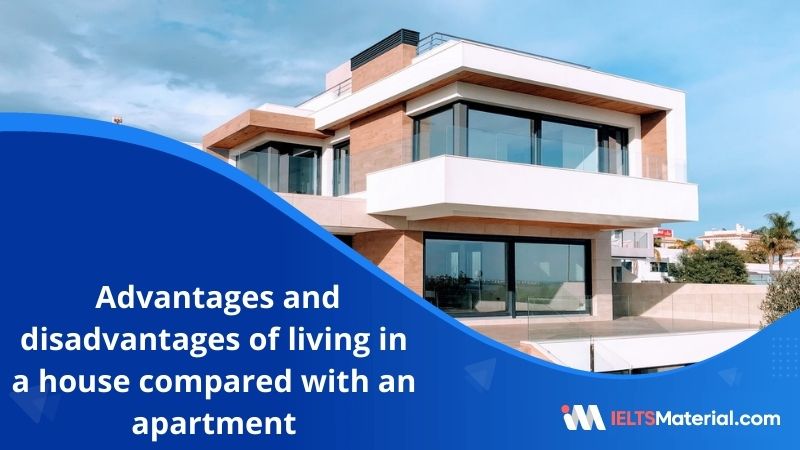
Limited-Time Offer : Access a FREE 10-Day IELTS Study Plan!
Some people prefer to live in a house, while others feel that there is more advantage to living in an apartment. Are there more advantages than disadvantages of living in a house compared with living in an apartment?
Advantage – Disadvantage Essay
Introduction
Sentences 1, 2, & 3: Introduce the topic.
Sentence 4 – Both the subtopics (house and apartment)
Body Paragraphs
Paragraph 1- Advantages and Disadvantages of a house
Paragraph 2 – Advantages and Disadvantages of an apartment
Sum up and state the final opinion.
Sample Essay
With the changes in lifestyle, preference of living standards, basic amenities and concept of luxury have also changed for each person. Earlier, people used to aspire for a house of their own due to the large number of members in the family. But now, most individuals, due to security issues and small families, feel a need to move to apartments. In this essay, the advantages and disadvantages of both sides will be discussed to reach a conclusion.
In former times, family members used to live together and so required big houses to accommodate them all. Owning a house was a status symbol in many places. As a house is built according to the individual’s convenience , it is a personalized space that is decorated or organized in accordance with the necessity. It offers privacy to everyone and is less noisy even though many people live in it. One can have a garden or a free space to relish some moments of peace. Unfortunately, everything has its own disadvantages. The freedom one adores in a house comes with a price. It is exorbitant to maintain the structure and facilities in place. The cost of buying the land as well as constructing the house is so high that many people tend to lose it to the banks to pay their loans. There is no safety. Anyone can enter it unless one is careful.
Buying apartments or flats instead of a house has become widespread. Families, nowadays, have become smaller and so they need less amount of space. Secondly, when a person owns a flat, he/she need not worry about security as every compound has assigned guards throughout the day. Thirdly, one need not worry about the regular maintenance as a certain amount of money is paid and upkeep is done by the building authority. Each society has their own conveniences like gyms, gardens, swimming pools and other. Further, most apartments are consciously built in areas with other accommodation like markets, transport facilities, etc. Like houses, apartments too have their drawbacks . The major problem is the lack of space and privacy. Although one can buy larger apartments according to their need, it will be extravagant. Yet, compared to building a house and maintaining it, an apartment is less costly. Moreover, there are various rules and regulations that the inhabitants have to follow in order to maintain the living standard of the society.
In conclusion, it can be said that although both of them have their benefits and difficulties, it completely depends on the prerequisites of the person who will buy the house or the apartment. In my case, I feel owning an apartment is more suitable.
Meaning: a feeling of liking or wanting one person or thing more than another person or thing Eg: They have a preference for the white lily.
Meaning: something that helps to provide comfort, convenience, or enjoyment Eg: The organization offered all the basic amenities to the residents.
Meaning: to want something very much or hope to achieve something or be successful Eg : He aspires to be a doctor.
- Accommodate
Meaning: to provide with a place to live or to be stored in Eg: He decided to accommodate the needs of his family in his plan for the future.
Meaning: the position of an individual in relation to another or others, especially in regard to social or professional standing Eg: It was appreciated that we are no longer judged by the status of our family.
- Convenience
Meaning: a quality or situation that makes something easy or useful for someone by reducing the amount of work or time required to do something Eg: “Do not worry, complete it at your own convenience.”
Meaning: to like or enjoy something Eg: She and her friends always relish the idea of a sleepover.
Meaning: to love and respect someone very much, or to like something very much Eg: The little girl adores her new brother.
Meaning: much more than is reasonable Eg: The officer asked for an exorbitant amount of money to permit them to work on the land.
Meaning: the negative part of a situation Eg: “I could not find any drawback of the location you chose for the office.”
More Writing Task 2 Essay Topics
- Many Small Local Shops Have Closed Because Customers Travel To Large Shopping Centers
- Tourism is An Ever-Growing Industry
- Spoken Communication is More Powerful Than Written Communication
- University Students Should Study Whatever They Like
- Technology is Increasingly Being Used to Monitor What People Are Saying And Doing
- IELTS Essay Topics
- IELTS Sample essays
- IELTS Writing task 2 Tips
- Tips to Improve IELTS Writing Skills
- IELTS Writing recent actual test
- IELTS Writing Answer sheet
Practice IELTS Writing Task 2 based on Essay types

Start Preparing for IELTS: Get Your 10-Day Study Plan Today!
Janice Thompson
Soon after graduating with a Master’s in Literature from Southern Arkansas University, she joined an institute as an English language trainer. She has had innumerous student interactions and has produced a couple of research papers on English language teaching. She soon found that non-native speakers struggled to meet the English language requirements set by foreign universities. It was when she decided to jump ship into IELTS training. From then on, she has been mentoring IELTS aspirants. She joined IELTSMaterial about a year ago, and her contributions have been exceptional. Her essay ideas and vocabulary have taken many students to a band 9.
Explore other Advantage Disadvantage Essays

Nehasri Ravishenbagam

Post your Comments
Recent articles.

Kasturika Samanta
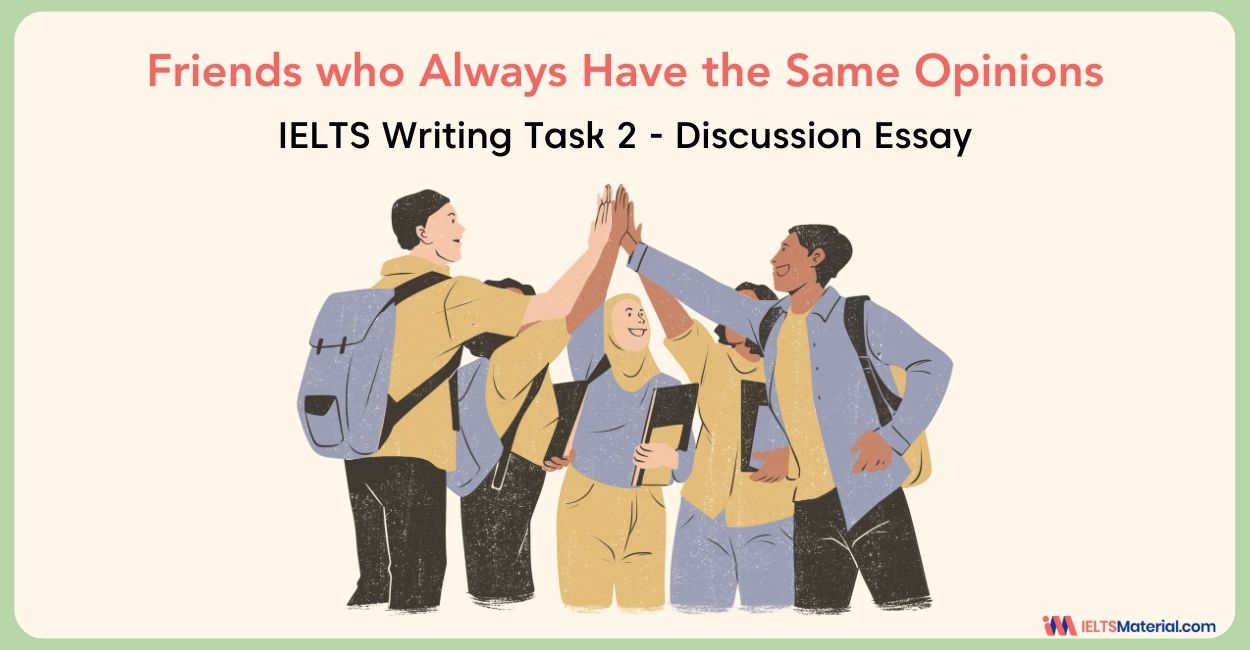
Raajdeep Saha
Our Offices
Gurgaon city scape, gurgaon bptp.
Step 1 of 3
Great going .
Get a free session from trainer
Have you taken test before?
Please select any option
Get free eBook to excel in test
Please enter Email ID
Get support from an Band 9 trainer
Please enter phone number
Already Registered?
Select a date
Please select a date
Select a time (IST Time Zone)
Please select a time
Mark Your Calendar: Free Session with Expert on
Which exam are you preparing?
Great Going!
- our Services
- The way it works
- Our Advantages
- sample essays
House vs. Apartment
What is better: a house or an apartment? Undoubtedly, there are pros and cons in each option, but quite often when comparing an apartment and a house, people think about a transport availability of apartments, and comfort of a private house, losing the other important features of these two options.
When moving to a private house, people do not just change a fumed and cramped city apartment to a clean air and space of a private home. People change their style and the way of life drastically; plus, their rhythm and routine, environment, and balance of a family fall under changes, as well. People abandon the old habits and introduce new species to the list of expenses. Therefore, several moments should be taken into consideration in this discussion.
First of all, there is transport availability. Everyone knows that to get out of a sleeping area to the city center is much easier than from a suburban area. It can be supposed that a person has a car to get to the city. So, he/she does not see a significant difference between an automobile race from an apartment, or from a house. However, in such a case, each member of a family should have one. If not, then they have to learn the schedule of public transport. In addition, commuting from a house takes much more time than from an apartment.
Secondly, there is an infrastructure issue. Many problems can be avoided if there is extensive infrastructure near a private house – a kindergarten, a school, shops, leisure centers, etc. – but this is quite rare. Usually, an apartment has such a bonus. When to live in a house, in a private sector, people need to plan their schedule of travel – travel with children to school, buy food at the nearest shopping center, etc.
Thirdly, people need to weigh costs for both options. Many people are captivated by a comparative cheapness of suburban real estate – an apartment in a city may be exchanged for a house even with a suburban site. What is more, frequently, private sectors are close to suburban shopping centers or suburban cities, and happy homeowners believe that here they will be able to save on essential goods. However, at the same time, people forget that utilities for a house and an apartment are significantly different. There are cases when a cottage owner sells a house because he is unable to pay for petrol and constant trips to a city, as well as, to pay for the service on the house. Hence, the opportunities should besensibly weighed.
Lastly, among other factors the following can be mentioned: economic issues, isolation from a city life, a human factor, etc. Of course, all these problems are related. A house may be situated in a town neighboring a big city with a rich infrastructure. It can be located in a place with accessible transport. Finally, a city apartment can also be in two hours away from a work place. However, to make a final decision, one better knows in advance about all the pitfalls of moving out of a city, so that a person does not face an unpleasant surprise when nothing can be changed. Overall, both options are great: whether it is an apartment or a house with its bonuses; everything depends on a person since both options require special way of life. When people talk about an apartment, a person leads a hectic life which is aimed at meetings, conferences, career and friends. A house provides a cozy home atmosphere for those who plan their family and like to devote their time to them and a house itself.

- Assessment of the Feasibility of Different Techniques
- Comparison of Art
- Marriage vs. Living Together
- Contrasting China and Japan
- Times New Roman 12 pt
- Single or double-spaced
- 300 words/page
- Text aligned left
- One-inch margins
- More than 1500 qualified writers
- Prompt delivery starting from 3 hours
- Any topic and any complexity level
- Direct contact with the writer
- Individual approach
- Modern sources
- Customer support 24/7
- Stable discounts
Living At Home Versus Living In An Apartment Essay
Living in a house and living in an apartment have their own set of advantages and disadvantages. An apartment is relatively cheaper and easier to maintain than a real house. An apartment dweller, however, has to deal with responsibilities such as paying the rent on time and complying with the rules of apartment personnel. A house, meanwhile, is considered as an investment in property; homeowners have to deal with mortgage payments, as well as utility bills.
Living in an apartment is one of the first real steps towards independence for some individuals, in contrast living in your own home is synonymous to responsibilities such as being able to make mortgages payments consistently.
There are many pros and cons to consider making the decision to live at home or an apartment, But always most people will take one option more than another. As the saying goes, with freedom comes responsibility. Young usually are eager to their 18 years to move into an apartment and have independence.
They view the apartment as an oasis of freedom, and it is relatively cheaper and easier to maintain than a real house.
Living In A House Vs Living In An Apartment Essay
On the other hand, for many people buy a home is one of the most significant moments of their lives. According Li, Wenli; Yao, Rui “The United States is increasingly becoming a country of homeowners. As reported recently by the Census Bureau, close to 70 percent of households now own their primary home. Homeownership is no longer just an American dream; watering lawns, sweeping sidewalks and cleaning drain gutters is no longer the sole privilege of middle-income and affluent households.

Proficient in: Economics
“ Writer-marian did a very good job with my paper, she got straight to the point, she made it clear and organized ”
With the rise in the homeownership rate, an increasing share of household wealth is tied to housing.
According to the Federal Reserve Board’s Flow of Funds account, residential property accounts for over 30 percent of total household assets, and home equity accounts for over 20 percent of total household net worth” (Li, W. ,Yao,R. 2006). In my opinion, renting an apartment is much simpler than buying a house. There is no mortgage to arrange, no need to prorate property taxes or insurance payments between the old and the new tenant, and, in most cases, no need to enter the transaction in public records as must be done when a building is sold.
Anyway as information retrieved from Everest College e-Library, point that, “A cash deposit as security against damage to the property and prepayment of rent for one or two months may be required. In such cases a new tenant, like a home buyer, may need a substantial amount of ready cash (Housing, 2009). Making the decision to either rent an apartment or buy a home involves more than simply comparing rental rates and mortgage payments. Privacy can be one factor that is definitely affected, somewhat negatively, when it comes to apartments. There are families all around, and invariably some of them are rather curious about what you are doing.
The specialist Steve McCutchen said that: “Apartments invariably tend to have thinner walls than private homes, with the result that what you are doing inside your home might also end up getting known by your neighbors, even if you try your best to keep the noise level to the minimum. In fact if you inverse the situation and heighten the noise element, say when you are having a party at home, there will invariably be protests from your neighbors, which is an unlikely scenario in private homes that often tend to insulate sounds from going too far” (McCutchen, 2010).
Anyway this element of privacy has a positive side to it as well; in case of trouble, you have people around you who could assist. In private homes, in case you are alone and find yourself in trouble, chances of somebody else coming to your rescue, simply off the cuff, are quite less. This aspect gets heightened when we take note of the fact that a many apartment complexes have additional provisions for security, which is often completely missing, in the case of private homes. Thus, when it comes to the aspect of security, apartments tend to have an edge.
Space is one of the foremost aspects that previous private home owners, now living in apartments, sorely miss. Undoubtedly, apartments tend to have much lesser space. The size of the apartments is a major area of concern. Additionally, other aspects such as space in the driveway as well as space to park one’s car(s) also tends to be much less. Although if you are thinking of having your own little garden, invariably you might just have to drop the idea altogether! Thus, as you can clearly see, there are both advantages as well as disadvantages to living in apartments and living in house.
Ultimately, it is about how well you are able to adjust to the same, as well as which are the factors that truly affect you, either way.
Housing, E. B. (2009). eLibrary. Retrieved from http://elibrary. bigchalk. com McCutchen, S. (2010).
Ezine Articles. Retrieved from Ezine Articles: Li, W. , Yao, R. (2006, January 01).
Your House Just Doubled in Value? Don’t Uncork the Champagne Just Yet!. Business Review – Federal Reserve Bank of Philadelphia, 25, Retrieved from http://elibrary. bigchalk. com
Cite this page
Living At Home Versus Living In An Apartment Essay. (2019, Dec 05). Retrieved from https://paperap.com/paper-on-essay-living-home-versus-living-apartment/
"Living At Home Versus Living In An Apartment Essay." PaperAp.com , 5 Dec 2019, https://paperap.com/paper-on-essay-living-home-versus-living-apartment/
PaperAp.com. (2019). Living At Home Versus Living In An Apartment Essay . [Online]. Available at: https://paperap.com/paper-on-essay-living-home-versus-living-apartment/ [Accessed: 9 Apr. 2024]
"Living At Home Versus Living In An Apartment Essay." PaperAp.com, Dec 05, 2019. Accessed April 9, 2024. https://paperap.com/paper-on-essay-living-home-versus-living-apartment/
"Living At Home Versus Living In An Apartment Essay," PaperAp.com , 05-Dec-2019. [Online]. Available: https://paperap.com/paper-on-essay-living-home-versus-living-apartment/. [Accessed: 9-Apr-2024]
PaperAp.com. (2019). Living At Home Versus Living In An Apartment Essay . [Online]. Available at: https://paperap.com/paper-on-essay-living-home-versus-living-apartment/ [Accessed: 9-Apr-2024]
- Living At Home Vs Living On Campus Pages: 3 (779 words)
- Advantages Of Renting an Apartment Pages: 4 (1103 words)
- Project Proposal Apartment DirectorI have been selected to be Pages: 3 (742 words)
- Task about Renting An Apartment Pages: 5 (1309 words)
- Essay Examples on Home Sweet Home Pages: 3 (618 words)
- Living In Your Dreams Or Living In Reality Essay Pages: 2 (433 words)
- A Home Away From Home: A Deep Dive into D Pet Hotels Pages: 2 (460 words)
- a study of elderly living in old age home and within a family setup in jammu Pages: 9 (2662 words)
- Millennials Living at Home: Freeloaders or Intellectuals Pages: 5 (1252 words)
- Living the Orange Promise: An Insight into Home Depot's Mission Statement Pages: 2 (502 words)
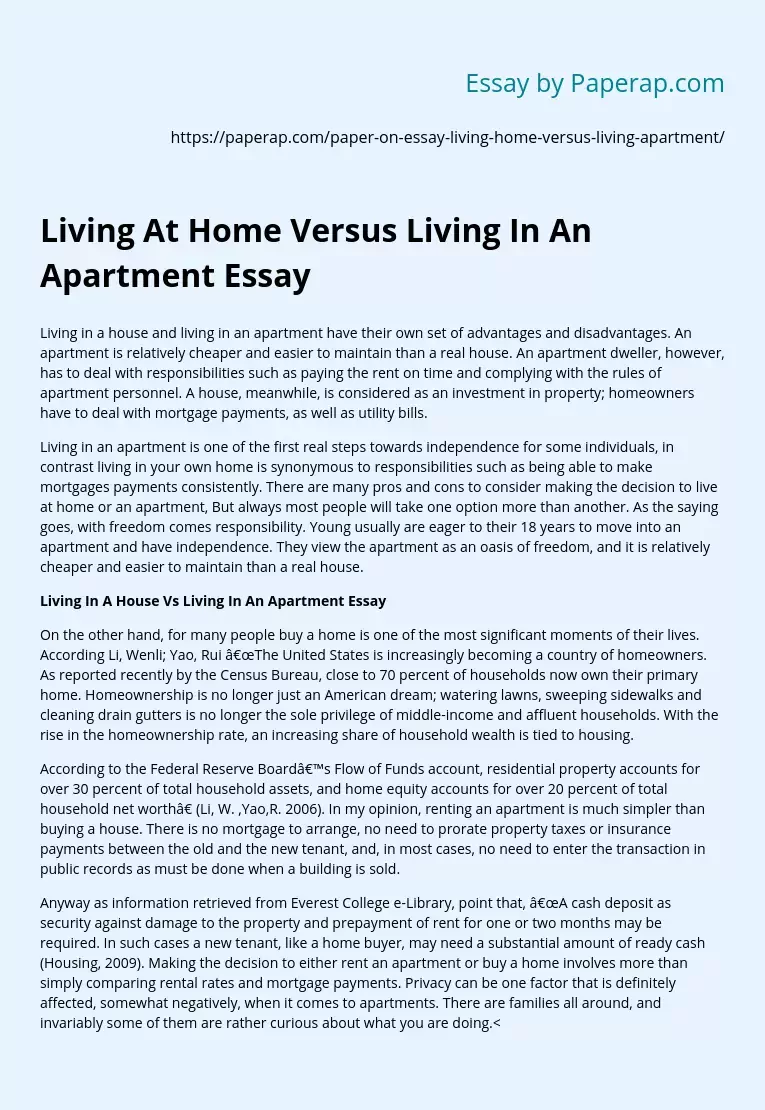

- House vs. Apartment Living
IELTS WRITING TASK 2
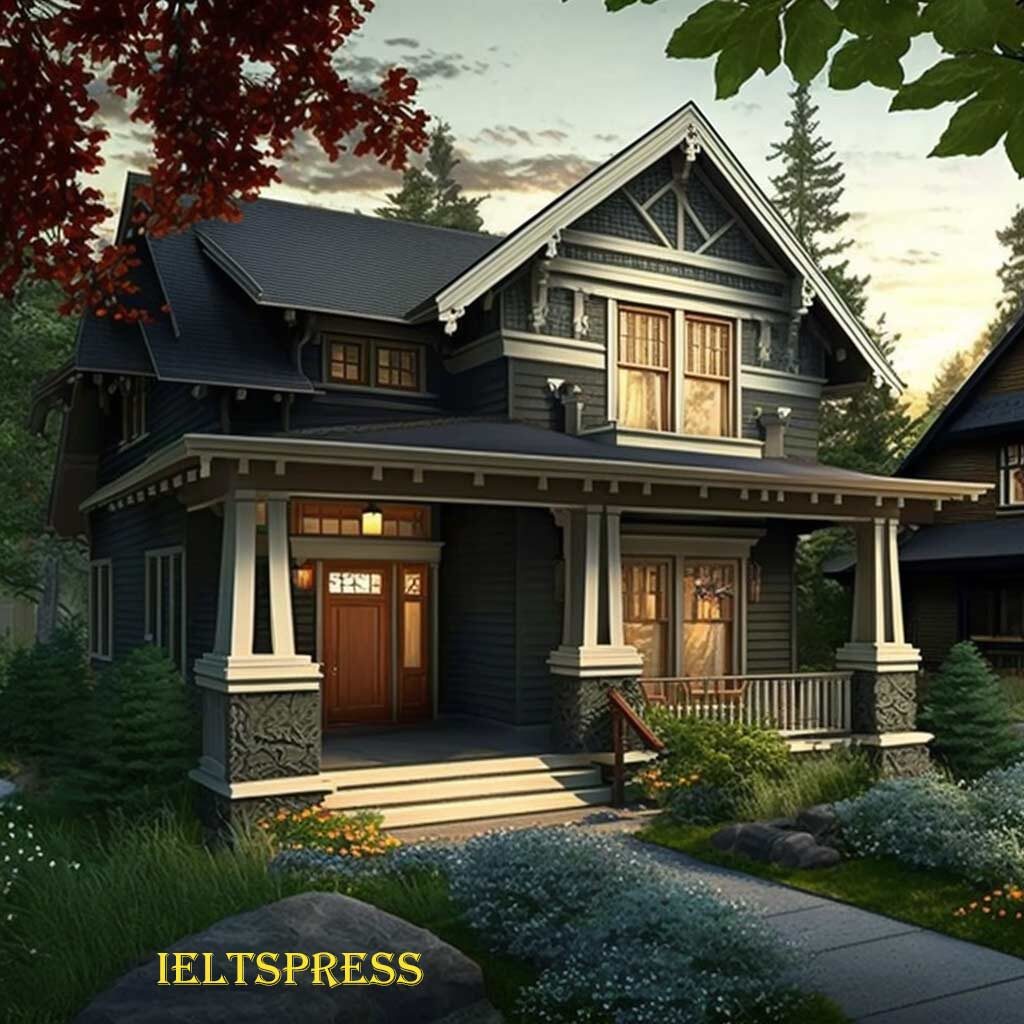
You should spend about 40 minutes on this task. Write at least 250 words about the following topic:
Certain individuals favor residing in a house, whereas others believe that living in an apartment offers more benefits. Do the advantages of living in a house outweigh the disadvantages when compared to living in an apartment?
Sample Answer, C1 English Level, Advanced, Band Score 6.5-7.5
- Paraphrase of the topic: Some individuals prefer living in a house, while others believe that apartments offer more benefits.
- Main opinion or idea: In my view, the advantages of living in a house outweigh the disadvantages, as it provides more freedom, privacy, and a sense of community.
- Supporting sentence: Houses offer greater freedom and autonomy for homeowners to personalize their living spaces according to their tastes and needs. (Personal experience with gardening in a house)
- Supporting sentence: Privacy is another advantage of living in a house as it provides a quieter and more private living environment due to being detached from neighboring units. (Personal experience with noise disturbance in an apartment)
- Summarize body paragraphs: The freedom, privacy, and sense of community that houses offer make them a preferred choice for many individuals.
- Restate main opinion or idea: Despite higher maintenance costs and longer commutes, the overall living experience in a house surpasses that of an apartment, and the decision should be based on individual preferences and priorities.
The decision between living in a house or an apartment has been a matter of preference for individuals. While some prefer the spaciousness of a house, others find the convenience of an apartment more appealing. In my view, the advantages of living in a house do outweigh the disadvantages, as it provides more freedom, privacy, and a sense of community.
One significant advantage of living in a house is the freedom it offers. Homeowners have the autonomy to customize their living spaces according to their tastes and needs. For example, I have always loved gardening, and having a backyard in my house allowed me to create a beautiful garden and relax amidst nature. Such personalization and freedom are often limited in apartments due to space constraints and building regulations.
Privacy is another crucial aspect that a house provides. Being detached from neighboring units, houses offer a quieter and more private living environment. I recall living in an apartment where noise from neighbors’ units often disturbed my peace and made it difficult to focus on daily tasks or rest adequately.
Furthermore, houses often foster a stronger sense of community. In many neighborhoods, residents tend to form close-knit relationships, organizing community events and helping one another. I experienced this firsthand when my neighbors and I collaborated to organize a neighborhood cleanup drive, which not only enhanced our living environment but also built lasting friendships.
While houses have their advantages, they may come with certain drawbacks. One significant downside is the higher maintenance costs associated with homeownership. Unlike apartments, where maintenance responsibilities fall on the property owner, homeowners are solely responsible for repairs and upkeep. Moreover, houses are usually located in suburban areas, which might result in longer commutes for work or other activities.
In conclusion, the advantages of living in a house, such as freedom, privacy, and a sense of community, make it a preferred choice for many individuals. While higher maintenance costs and longer commutes might be considered disadvantages, the overall living experience in a house surpasses that of an apartment. Ultimately, the decision should be based on individual preferences, lifestyle, and priorities to find the right fit for a comfortable and fulfilling living experience.
When it comes to housing preferences, people are divided between living in a house and residing in an apartment. The question of whether the advantages of living in a house outweigh those of living in an apartment has been a subject of debate. In my view, the benefits of living in a house tend to outweigh the disadvantages, as it offers more space, privacy, and a stronger sense of ownership.
Living in a house provides ample space, both indoors and outdoors. With multiple rooms and a backyard, there is more room for families to grow and have their own personal spaces. On the other hand, apartments often have limited space, which can become challenging, especially for larger families or individuals who enjoy more space for hobbies or recreational activities.
Privacy is another significant advantage of living in a house. Being detached from neighboring units, houses offer a quieter and more private living environment. In contrast, apartments can be noisy and lack the solitude that many individuals desire. Personally, when I lived in an apartment complex, I often experienced disturbances from neighbors, which affected my overall well-being and comfort.
Moreover, living in a house provides a stronger sense of ownership and control over one’s living space. Homeowners have the freedom to modify and decorate their houses according to their tastes and preferences, creating a space that truly feels like their own. Conversely, apartment dwellers may face restrictions on making significant changes to their units, limiting their ability to personalize their living spaces fully.
While houses have their advantages, it is essential to acknowledge some of the drawbacks they might pose. Houses generally require more significant maintenance and repair costs compared to apartments, where many maintenance responsibilities fall on the property owner. Additionally, houses are often located in suburban areas, which might result in longer commutes for work or daily activities.
In conclusion, although both houses and apartments offer unique benefits, the advantages of living in a house, such as more space, privacy, and a stronger sense of ownership, tend to outweigh the disadvantages. While houses may come with higher maintenance costs and longer commutes, the overall living experience they provide makes them a preferred choice for many individuals seeking a place to call home.
The question of whether to live in a house or an apartment has long been a matter of personal preference. Some individuals advocate for the spaciousness and freedom of a house, while others believe that the convenience and amenities of an apartment outweigh any drawbacks. In my view, the advantages of living in a house do outweigh the disadvantages when compared to living in an apartment, as it offers more privacy, a stronger sense of ownership, and the opportunity for personalization.
Living in a house provides a higher level of privacy compared to an apartment setting. Being detached from neighboring units, houses offer a quieter and more secluded living environment. Personally, when I moved from an apartment to a house, I noticed a significant reduction in noise and disruptions, allowing me to focus better on my work and personal activities.
Furthermore, the sense of ownership and control over one’s living space is unparalleled in a house. Homeowners have the freedom to modify and decorate their houses according to their tastes and needs, creating a space that truly feels like their own. In contrast, apartments often come with restrictions on making significant changes, limiting the opportunity for personalization and individual expression.
Moreover, living in a house fosters a stronger sense of community. Many neighborhoods with houses tend to form close-knit relationships among residents, organizing community events and providing support to one another. In my own experience, my neighbors and I organized a neighborhood watch program, promoting safety and a sense of belonging.
While houses may have certain drawbacks, such as higher maintenance costs and longer commutes in suburban areas, the advantages they offer in terms of privacy, ownership, and community outweigh the disadvantages. Ultimately, the choice between a house and an apartment depends on individual preferences, lifestyle, and priorities. However, for those seeking a space they can truly call their own, a house often provides a more fulfilling and rewarding living experience.
In conclusion, living in a house does indeed have more advantages than living in an apartment. The higher level of privacy, sense of ownership, and opportunity for personalization make houses an appealing choice for many individuals. While apartments may offer convenience and amenities, the overall living experience in a house surpasses that of an apartment, making it a preferred option for finding the ideal place called home.
QUICK LINKS
Speaking Part 1 Speaking Part 2 Speaking Part 3 Reading Mini Test Academic Reading Full Practice Test General Reading Full Practice Test Writing Task 1 Writing Task 2 Ielts Listening Practice Test Ielts Listening Full Practice Test
Single Lesson Complete IELTS Program Essential IELTS Package Quick IELTS Course Book With Us
IELTS PRESS
About Ielts About Us Testimonials Privacy Policy

Social Media Directory
©2021. IELTS PRESS. All Rights Reserved.
IELTS is a registered trademark held by IELTS Partners, encompassing the British Council, IELTS Australia Pty Ltd, and the University of Cambridge ESOL Examinations. These entities were not engaged in the creation of, and do not support, this website.
Single Lesson with Master Shane Complete IELTS Program Essential IELTS Package Quick IELTS Course Book With Us

The Difference Between Living in a Home or in an Apartment

Pros & Cons of Dorms Vs. Homes
Whether you're a college student moving away from home for the first time or you're out in the working world and looking for a place to rent, there are several options on the housing market. Your personal needs and budget will often dictate what kind of housing you get, and there are advantages and disadvantages to each type. Generally, homes -- including mobile homes -- bring more space and privacy, while an apartment costs less to rent and to maintain.
A "stick-built" home, one that is firmly attached to the ground, generally costs more to rent than an apartment. A mobile home's rent usually is about the same as or a little more than an apartment, though location and condition can change these numbers around. A home or mobile home might allow for roommates more feasibly than an apartment, allowing you to split some of the rental costs. Utilities also could cost more in a house or mobile home because of the larger space. Mobile homes are not as airtight as an apartment or stick-built house, so that may jack up your heating and air-conditioning costs even more.
A one-bedroom apartment usually carries about 600 to 800 feet of floor space, which is much smaller than most homes. Small houses commonly start at about 1,000 square feet. A small 66-foot-long mobile home has a little more than 900 feet of interior space, and even the smallest ones usually have two bedrooms. An apartment usually has no yard and there's often no place to sit on the porch, while homes can offer both amenities.
Maintenance
With all rental properties, most repairs fall on the owner. This could mean anything from fixing a toilet to replacing a door, but some landlords may be slow about repairs. Apartments usually provide lawn care. With a stick-built or mobile home that has a yard, you may have to tend the lawn yourself, and your landlord may strictly enforce its upkeep.
Neighbors and Privacy
While the type of neighbors you get depends on the area, in an apartment you're in close quarters with many of them. You'll often hear your neighbors, particularly any that live directly above you. If you value your sleep, the neighbor's stereo might keep you awake -- although most apartment buildings have noise restrictions that might help control such problems. With a home, you usually will have more privacy, any yard space serving as a buffer between buildings.
House Rules
Because of space and proximity to neighbors, apartments often have more stringent rules than a home. You might not be able to keep a pet or modify the interior, for example, while the landlord for a home may be more flexible in such policies. In an apartment you'll likely have more restrictions on having friends stay over than with a home.
Related Articles

Is It Cheaper to Rent a House or Stay in a Dorm in College?

Is It Better to Stay in Dorms or an Apartment?

Pros & Cons of Living at Home During College

Dorm Vs. Fraternity

Colleges That Do Not Charge Out of State Fees

Differences Between City & Country Life

What Do College Kids Need in Dorm Rooms?

Types of Living Arrangements for College Students
Al Bondigas is an award-winning newspaperman who started writing professionally in 1985. His print credits include the "Mohave Valley Daily News" and "The Mohave County Standard." Bondigas studied journalism at San Bernardino Valley College in California.
IELTS Practice.Org
IELTS Practice Tests and Preparation Tips
- Band 9 IELTS Essays
Discuss The Advantages And Disadvantages Of Living In A House And Living In An Apartment | Band 9 Advantages And Disadvantages IELTS Essay Sample
by Manjusha Nambiar · Published October 3, 2021 · Updated April 26, 2023
Discuss the advantages and disadvantages of living in a house and living in an apartment. In your opinion which is better?
Here is a band 9 essay sample on this topic. Need help with IELTS writing? Get your IELTS essays, letters and reports corrected by me.
Band 9 IELTS essay sample
While some people live in standalone houses others live in apartments. I prefer living in a house because it provides more freedom and privacy. The merits and demerits of both types of residences will be discussed in this essay.
Living in a landed home has many benefits. Mainly, it offers a sense of freedom as the owner can renovate and decorate the house according to their own choice without any restrictions. Moreover, an owned house is a family treasure which makes people proud and elevates their social status. An independent house offers ample privacy. It is possible to extend the home by building more rooms or other living spaces. On the other hand, security can be an issue, especially for older people living in standalone homes. Houses are also more likely to be located in small towns or rural areas where land prices are low. Consequently, they may not have easy access to railway stations or shopping malls.
Living in the apartment has its own plus points too. Indeed, mostly flats are built in cities or towns where they have easy access to all fundamental facilities. In addition, they offer additional amenities like gymnasiums, amphitheatres and swimming pools within the premises. Living in a flat is safer than living in a standalone home. Most apartment complexes have security guards. Also, on the same floor, there will be two to six apartments. This arrangement offers residents ample opportunities to socialize. On the downside, flats are usually cramped spaces. Also, it is not possible to make alterations to the structure. The occupant, for example, cannot add additional living spaces or remove a wall. Privacy is another issue and occupants are usually exposed to a noisy environment. For example, if someone is sleeping, the noise from the flats below or above can disturb them.
In conclusion, both houses and apartments have their advantages and disadvantages. Houses are more suitable for people who want large living spaces in more private and quieter surroundings. Apartments suit small families that seek more security and easier access to various amenities.
Do you have an essay on this topic? Submit it below in the comments for a free band score estimate. You can find more advantages and disadvantages IELTS essays here .
For English grammar and vocabulary lessons, visit my blog perfectyourenglish.com
Quick Links
- Band 7 Essay Samples
- Band 8 Essay Samples
- IELTS Practice Tests
- Band 9 Letter Samples
Tags: advantage disadvantage ielts essay band 9 essay band 9 essay sample band 9 ielts essay ielts advantage disadvantage essay ielts band 9 essay
Manjusha Nambiar
Hi, I'm Manjusha. This is my blog where I give IELTS preparation tips.
- Next story Nowadays, Fewer People Tend To Look After Their Old Relatives And Send Them To Old Age Homes | Band 9 IELTS Essay Sample
- Previous story Modern Technology Is Changing Our World | Band 9 To What Extent Agree Or Disagree IELTS Essay Sample
- Academic Writing Task 1
- Agree Or Disagree
- Band 7 essay samples
- Band 8 letter samples
- Discuss Both Views
- Grammar exercises
- IELTS Writing
- Learn English
- OET Letters
- Sample Essays
- Sample Letters
- Writing Tips
Enter your email address:
Delivered by FeedBurner
IELTS Practice
Find anything you save across the site in your account
Here’s Why I’ll Never Go Back to Apartment Living
By Ali Montag

On evening walks around my South Austin, Texas, neighborhood, I pass an apartment complex with a giant blue sign. It reads, “Better than you can ever imagine!” This sign looks absurd hanging from an otherwise nondescript brick building with street parking and shared dumpsters. Still, when I pass it, I smile. “Better than you can ever imagine!” is always the promise of our apartments—at least at the beginning.
In 2016, when I signed the lease for my first apartment in Manhattan’s Morningside Heights, a fifth floor walk-up shared with a stranger I met through a real estate agent with a sprout of coily chest hair, I knew what I was renting was cramped and criminally overpriced. I still hoped it would be better than I could ever imagine. Taking the keys felt like receiving my passport to adventure. Who cared if the front door opened right into the toilet? An apartment was for sleeping, showering, and reapplying mascara. Its value was mobility: “I’m here because I’m going places.”
To save money, I built my IKEA furniture myself, wood splintering from my screwdriver , my bed’s headboard going in upside down and backward. I slept on that broken bed for four years: one year in my first apartment, three in my second. I could have eventually gotten something nicer, but I never did. A sturdier bed would require a U-Haul for moving and I needed to be flexible. In a Manhattan apartment, disposable is better.
There’s beauty to such an apartment. It’s intentionally transitory, a decision up for renegotiation every year. The black-and-white tile floors of my second apartment building, built in 1910, harkened back to an era when ladies might clack across them in heels. I loved to picture those women, their pinned curls, their swishing skirts. I was just one more tenant, another girl passing through. Then, in 2020, things changed. My apartment, once my ticket to freedom, became my only place to shelter. I spent three months listening through the walls to the lives of the neighbors I’d never met. They answered work calls, blared reggaeton, and smacked spoons against pots. I scraped the bottom of a Chipotle burrito bowl with a plastic fork night after night, alone. I was so close to other people—below them, above them, beside them—yet separate. In an apartment building, when you can hear all the lives that aren’t yours, “you end up not so much living alone as feeling alone,” Nancy Franklin once wrote.
Last spring, my landlord sent a letter. Did I want to renew? I thought about it and cried for a while. The answer was no, I didn’t. I took a one-way flight home to Austin, Texas.
I’m now one year into living differently, no longer a city dweller but the occupant of a house with a roof and an attic. Instead of paying $1,300 per month for a high-rise apartment in New York, I pay $900 per month to rent half of a 1935 duplex. My screen door opens onto a patch of yard, shaded by a gnarled old tree. Here I grow basil, mint, and chives, bougainvillea, geraniums, and sunflowers. My neighbors keep chickens, one house has goats.
The interior of the house is furnished entirely by my family’s generosity: My aunt pulled a cream chenille bedspread from her attic. My mom plucked a mahogany end table from the side of the road, sanded, stained it, and delivered it to my door. My grandmother offered feather pillows from her guest bedroom, thick and cool. Everyone raided their linen closets for spare towels and sheets. A ceramic lamp from my grandfather’s desk now sits on my own. There’s not a single thing I would ever consider throwing away. What’s the difference between a house and an apartment? For me, it’s partly geographic (houses are easier to rent in Texas than in New York) and partly economic (lower rent affords me more time, less stress). The logistics are the same: I’m still a renter like 35 percent of other Americans , forgoing equity, and living with the precarity of an uncertain future.
But the structural differences are probably the most important. In a neighborhood—a place where people sit outside to have coffee, mow their front lawns every Sunday, and take out the trash bins every Tuesday—familiarity is easier. A layer of what the author Eric Klinenberg calls social infrastructure develops, created by “public spaces and gathering places,” like my neighborhood’s community garden, local elementary school, and public library, “which can help foster human interaction and collective life.” Of course social infrastructure exists in cities too, at cafes, in parks, and among civic organizations , but it requires commitment: You have to stay in one place long enough to find it. For me, the biggest difference is one of intention. I signed the lease for this house with the intention to stay put, to plant roots, to cultivate something beautiful from the dirt. My family no longer asks, “Are you going to renew next year?” Instead, they wonder, “Does your Walmart have Fresca? Mine’s out.” It’s true I won’t live in this house forever. In the end, all of our homes are temporary—one way or another. But what if we made the decision to commit anyway? What if we didn’t wait for the perfect place, the apartment that would be “Better than we could ever imagine!” What if we decided to appreciate the spaces we live in while we lived in them, to give of ourselves, to make an explicit choice to open doors and meet our neighbors? If we did, any house might become a home.

By Kristin Corpuz

By Kristi Kellogg

By Morgan Goldberg

By Terri Williams
Apartment Living vs. Dorm Living
Introduction.
Living in a residence hall or an off-campus student apartment is largely determined by the financial capability of the student through this varies from campus to campus. We find that living in dorm can be fun but also it has its limitations. There is no certain measure to determine which one is cheaper between the dorm and the apartment. In some colleges, living in dorm is much cheaper than the apartments but in other colleges students prefer to live in apartments which are charged at a lower cost than the dorm. Some of the benefits associated with living in a hall of residence include.
The students have a lot of freedom because their parents will not be around to control their children’s everyday life and most of the students prefer it that way. One cannot be lonely for there is always someone to turn to in case of boredom. The dormmates provide a friendly atmosphere for socializing and making new friends. “One is not expected to pay monthly bills, the space for cleaning is less and this makes life to be easier and simple.” (Naomi, 2007) There is convenience for the students can stay late in the library and also they don’t have to deal with the hassles of commuting to be in class on time. In some rooms, students are provided with free internet access as opposed to the apartments where one has to pay for him/herself. Dorm living enhances interpersonal skills and coping or getting along with other people outside the campus becomes easy. Students also feel that they are part of the campus and they own the institution. It is also fun and most of the students find it exhilarating for they share a lot with the roommates. Apart from the benefits, there are some drawbacks that are associated with living in hall of residence. For instance, there is lack of privacy for in most cases you are sharing some items with your roommate. Conflict may also arise and especially when there is a disagreement between the roommates. “Apartments are much quieter than living in dorm and that is the reason why some prefer not to live in hall of residence.” (Williams & Thompson, 2004) Socializing can get worse for some of the people that you meet may not be the one you want.
The grapevine, gossip and rumor mongers may bring a lot of drama and this is as a result of too many people living in a very small space. The meals provided by the campus sometimes may be of poor quality and also one has no choice but to take what is provided on the cafeteria. There are those students who prefer living in apartment as opposed to hall of residence. However, they experience some problems. Keeping with classwork as well as maintaining the apartment cleanliness may affect the performance of the student because the size of the apartment may be big enough. There are so many restrictions from the apartment personnel of dos and don’ts which need to be followed meaning that freedom are curtailed. Sometimes a student may decide to stay late in library and therefore they will have to risk their life commuting to their apartments. They also strain their budget to cater for their daily upkeep and traveling expenses to and from the apartment. “The liabilities are so many and they are not under their control.” (Crystal, 2007) There is so much boredom and the tenants do not socialize and in some cases they hardly know each other. One of the tenants was heard saying “last night somebody broke into my apartment and replaced everything with exact duplicates….when I pointed it out to my roommate, he said, “Do I know you?” (Steven W, 2005) Sometimes the neighbors may produce a lot of noise that will affect the concentration of the student. There is no inducement to go out at any time they feel like for the apartment may be in unsafe environment. Apart from the disadvantages of apartment living, the students enjoy some benefits in that they have the freedom to relocate to a different apartment if they are not contented with where they live. This means they expand their career as well as lifestyle opportunities that may be offered in another city or state of residence. The concentration of people offer amenities that is not possible to get if one is living in a hall of residence. The issue of insecurity is minimal for the gate access is manned by hired trained security men. This is also fun especially during their leisure time since disturbance is minimal. Apartments offer “relaxation with pools, convenience with laundry, no hassle utilities like cable and internet access and a built in neighborhood that any student would be envious of.” (Angel & Julia, 2006).
In conclusion, what students should remember is that neither living in apartment nor dorm living is perfect and what they need to know is that both have something to offer. The trick behind deciding where to live should be based on the focusing on the good side of each place and learn to live in different places as the nature will provide. As for my opinion, the apartment living provides great opportunities and growth. Those students living in apartment enjoy stress free lifestyle and they enjoy the freedom of choice on where to live.
Angel & Julia, Does anyone actually like living in apartment? New York: Macmillan 2006.
Crystal Ray, The Disadvantages of Renting an Apartment: It is not for Everyone. New York: Harvard University press 2007.
Naomi Rockler-Gladen, Should You Live in a Dorm room? New York: University of Houston. 2007.
Steven Wright, Apartment Living. New York: Harvard University. 2005.
Sue Williams, Jimmy Thomson, Apartment Living: The Complete Guide to Buying, Renting, Surviving and Thriving in Apartments. New York: ABC Books, 2004.
Cite this paper
- Chicago (N-B)
- Chicago (A-D)
StudyCorgi. (2021, October 14). Apartment Living vs. Dorm Living. https://studycorgi.com/apartment-living-vs-dorm-living/
"Apartment Living vs. Dorm Living." StudyCorgi , 14 Oct. 2021, studycorgi.com/apartment-living-vs-dorm-living/.
StudyCorgi . (2021) 'Apartment Living vs. Dorm Living'. 14 October.
1. StudyCorgi . "Apartment Living vs. Dorm Living." October 14, 2021. https://studycorgi.com/apartment-living-vs-dorm-living/.
Bibliography
StudyCorgi . "Apartment Living vs. Dorm Living." October 14, 2021. https://studycorgi.com/apartment-living-vs-dorm-living/.
StudyCorgi . 2021. "Apartment Living vs. Dorm Living." October 14, 2021. https://studycorgi.com/apartment-living-vs-dorm-living/.
This paper, “Apartment Living vs. Dorm Living”, was written and voluntary submitted to our free essay database by a straight-A student. Please ensure you properly reference the paper if you're using it to write your assignment.
Before publication, the StudyCorgi editorial team proofread and checked the paper to make sure it meets the highest standards in terms of grammar, punctuation, style, fact accuracy, copyright issues, and inclusive language. Last updated: October 14, 2021 .
If you are the author of this paper and no longer wish to have it published on StudyCorgi, request the removal . Please use the “ Donate your paper ” form to submit an essay.
Living in a house is better than living in an apartment. Do you agree and disagree.
Unauthorized use and/or duplication of this material without express and written permission from this site’s author and/or owner is strictly prohibited. Excerpts and links may be used, provided that full and clear credit is given to Writing9 with appropriate and specific direction to the original content.
Use cohesive linking words accurately and appropriately
Linking words are very important in your essay.
To score effectively on your IELTS exam, you should make an effort to implement short concise sentences coupled with linking words.
Almost every sentence in your essay should have a linking word of some sort.
In fact, the only sentences that can omit linking words are your background sentence and thesis.
Linking word examples:
- in additional
- for example
- for instance
- even though
Discover more tips in The Ultimate Guide to Get a Target Band Score of 7+ » — a book that's free for 🚀 Premium users.
- Check your IELTS essay »
- Find essays with the same topic
- View collections of IELTS Writing Samples
- Show IELTS Writing Task 2 Topics
Some people believe that allowing children to make their own choices in everyday matters such as ( food , clothes and entertainment) is likely to result in a society of individuals who only think about their own wishes. Others believe that it is important for children to make their own decision about matters that affect them
In many societies, there is a growing emphasis on sustainable living and reducing environmental impact. what are the challenges of adopting a sustainable lifestyle what practical actions can individuals take to contribute to sustainability, we are becoming increasingly dependent on computers. they are used in businesses, crime, detection and even to fly planes. what things will they be used for in the future is this dependence on computers a good thing or should we be more suspicious of their benefits give reasons for your answers and include any relevant examples from your own knowledge or experience. write at least 250 words., with the rise of e-books comes the decline in paper books. some people see this as a good step forward while others do not. what are the advantages and disadvantages of this trend., wealthy countries should accept more refugees and provide them with basic assistance, such as food and housing. to what extent do you agree or disagree.
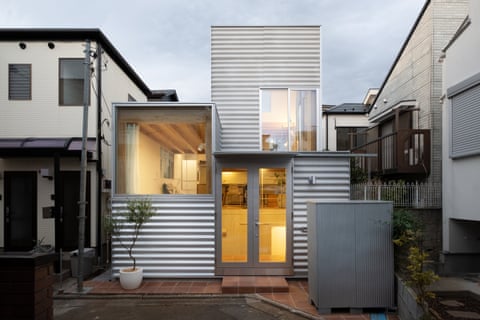
‘We live in the best house in the world’: five design experts on how to live better in small homes
From Ikea storage to the benefits of a solidly built table, architects from Paris to Tokyo share their tips and philosophy for living beautifully in smaller spaces
Australia has some of the largest homes in the world . Many who do live small aspire to one day live big. But around the world, limited space is not always seen as a sacrifice.
From Sweden, where the average size of an apartment is 68 sq metres , to Hong Kong’s micro flats as small as 18 sq metres, globally architects are used to getting creative with tight spaces – they must let as much light in and offer individuals and families the same flexibility as a larger home.
Demands for affordable housing in Australia, and the rising cost of living and building globally, has seen an increase in alternate living arrangements from granny flats , to van life to the tiny home movement. But small living doesn’t have to be microscopic. So how does the world live small well?
Madrid, Spain
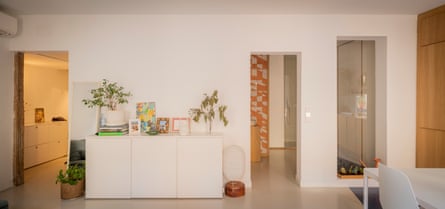
Architects Patricia Carrasco and Ricardo Mancho have lived in their 55-sq-metre apartment for the last five years. They say it is the “best house ever.”
“We wake up every morning and say we live in the best house in the world,” says Mancho.
The apartment’s living and sleeping areas are separated – the bathroom and bedroom are set back from the kitchen and open plan living, but the use of glass and floor-to-ceiling balcony doors allow natural light to reach every room, while curtains offer flexibility and privacy. Corridors function as storage for shoes and other household items, while plants fill the balconies and hang from the ceiling.
Mancho and Carrasco say that all this can be done cheaply: most of their cupboards and storage are from Ikea. Discarded materials from construction sites were used to make some furniture, like a marble slab that is now their coffee table.
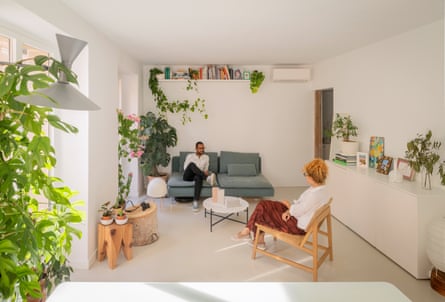
“Why this house is really good, even though it’s not really big, is because of its flexibility” says Carrasco.
For the few times a month when friends visit, bedside tables can brought into the living room as extra seating and the TV moved aside. “When we do yoga, we move the furniture around, and it really gives us freedom in a small space.”
The couple’s apartment is in one of Madrid’s “corralas” , dating back to the 1860s. With inward-facing patios, windows and doors facing inwards, which often remain open encouraging neighbours to talk throughout the day.
There are some sacrifices to be made. The couple would like an air fryer, but they don’t have the bench space. They have a one-person coffee machine to reduce clutter. But living small, they say, has made them live within their means.
“When I was a kid, I had a really big house with my family. I thought that my house had to be like that … and I really thought that I had to have a wardrobe for the plates … the kind of plates that you only use once a year.”
The size of the average home in Spain is growing and bigger homes are desirable. But cost and a desire to be in Madrid’s city centre has Spaniards in the capital sticking to 60 to 70 sq metres dwellings.
The couple are about to upgrade to a 90-sq-metre apartment, so their home can double as an office and have room for a future family. But they say this is their limit.
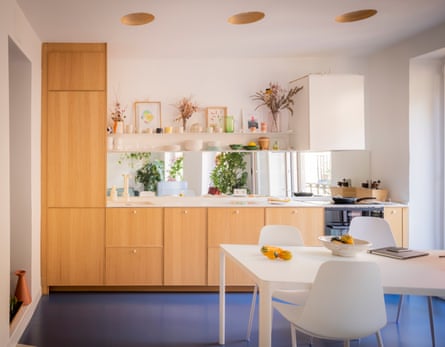
“If your house is 250 sq metres, that means that there is almost no density in your area,” says Mancho.
“If we have smaller houses, we have more density and density gives you everything … I work, and I have a place to buy bread, I say hello to the person selling flowers, I talk to people, I have an interaction with them. We love our neighbourhood.”
Paris, France
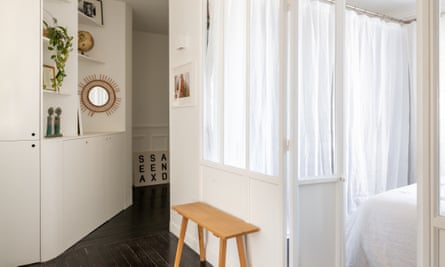
For architect Bertille Bordja, giving a second life to the historic buildings of Paris is a welcome challenge at her Ovo Studio business.
“Every corner, every centimetre in Paris especially, and in France, is precious,” says Bordja.
“We have a big history, so lots of buildings and old stones.”
Apartments in Paris are about 40 to 45 sq metres on average. Bordja says many Parisians are willing to sacrifice space to be in the city centre, where apartments are often in or next to iconic 19th century Haussman buildings that dominate the city.

Bordja commonly removes large corridors taking up valuable square metres, instead creating a thicker wall to house inbuilt storage, but maintaining the division of space and isolating noise. She also embraces open-plan kitchens and living areas to let light in.
Bordja says even though living smaller is normal, families in particular are always trying to find ways to squeeze in more space, and she encourages clients to think about the whole space, floor to ceiling.
“They ask, every time, for the famous third room, in the two bedroom apartments,” she says.
“I say, ‘you will have the third room, but maybe it is only eight sq metres, but it’s OK, it will work’. I work more with volume than with sq metres … eight in volume is very different.”

She always tries to use sustainable materials, often multiple times, throughout an apartment while maintaining the character of the space. Heritage buildings can have layers of structural problems under the surface, but Bordja says new developments made with cheap materials are not always easier to design for.
“It is very important for some French people to renovate, to take care of these buildings,” says Bordja.
New York City, US
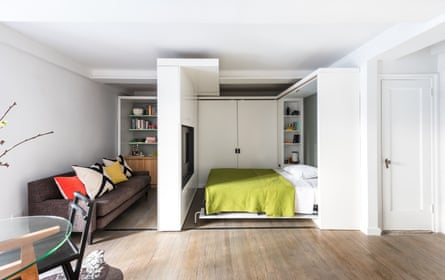
New York City is the most densely populated city in the US. In the historic, desirable suburbs of Manhattan, apartments are an average of 50 to 60 sq metres.
The founder and principal architect at MCKA , Michael Chen, says that there is “a spirit” to those who want to live in cities and smaller spaces.
Chen became known for designing small almost 10 years ago, when he took 36 sq metres and created the “five to one” apartment – a custom-built, fold-out, multi-use space.
“One thing about designing for small spaces is thinking about time and how the space evolves over the course of the day,” says Chen.
“There is a degree of motion and transformation that happens from morning to night.”
Demonstrating what Chen calls the “choreography” of living, the apartment’s sliding storage unit creates the ability to close away day or night “rooms” as required. Transforming a dressing room to a sleeping space to an open plan living space, the “zones of overlap” feel spacious, separate and deliberate.
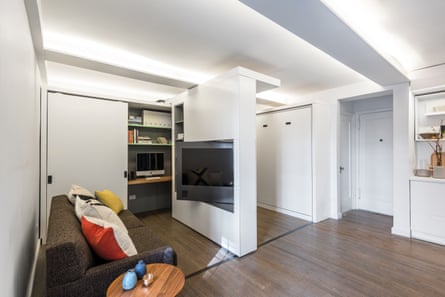
Chen says he also hopes such designs allow for living small can be done with grace.
As well as using custom-built, highly engineered and malleable solutions to tight spaces, Chen extols the virtues of a particular piece of traditional furniture: the table.
Another design trick he suggests is leaving some space empty, which allows for “visual and spatial relief”.
As prices rise in boroughs like Manhattan and Brooklyn, Chen says people are rethinking the way they live in their apartments, and “planning in place” for families instead of relocating.
“The idea that multiple people might be in a small space, means you need to allow for coordination and privacy.”
Tokyo, Japan

A city of 13 million, Tokyo is the most populated prefecture in Japan, where the average home is about 65 sq metres. At Unemori Architects , architect Ryosuke Koizumi says the smaller plots in the city force architects to think differently.
“I believe that thinking about spaces with extremes, such as light and dark, openness and closure, stretches the range of human perception,” says Koizumi.
Unemori project House Tokyo , built in 2019, has a total floor space of 50 sq metres despite being built on a 26-sq-metre block.
A house for two, it sits in a dark, narrow alley, but is full of light thanks to building upwards – a semi basement level for the bedroom leads up to an entrance, before the kitchen and dining areas on the first floor.

Above them, large windows and various ceiling heights make the home feel expansive, bringing natural light from multiple sides.
Like Hong Kong, Tokyo is also known for micro apartments , starting at just nine sq metres, but small spaces often mean that more time is spent out in the community.
“They frequently bathe in a nearby public bath . That’s why there is no bathtub in this house” he says.
Building upwards is also common. Views of the sky, neighbouring houses and streets means homes have a unique relationship with the space around them. In Tokyo, creating new shapes creates the uneven landscape the city is known for.
Melbourne, Australia
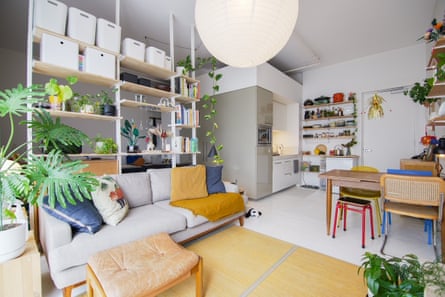
The founder of Never Too Small , Colin Chee, says small apartments in Australia are often seen as dark and dingy.
Chee bought a 37-sq-metre apartment off the plan in 2012. A year and a half later, he was shocked to find his flat was cramped, dark and narrow. But stripped of brand new, ill-fitting wardrobes and replaced with Ikea furniture, floor-to-ceiling storage and mirrors, it became his home.
He recently upgraded to 40 sq metres – what he calls the sweet spot – where he now lives with his partner and his dog.
But Chee says Australia places too much emphasis on size, over quality.
“My mum used to say … you cannot judge the quality or the nutrition of the food by the size of the plate,” says Chee.
Chee says that Never Too Small has inspired people to pick up on hacks for small living. Pick the right furniture (chairs with skinny legs and low backs keep the space open), choose sliding doors and curtains over permanent walls and add mirrors where they will reflect natural light.
Also in Melbourne, Chee says the Cairo flat is one of the best examples of how high ceilings, dividing curtains and multi-use spaces can make a small apartment sing. In the heritage listed 1930s art deco Cairo flats, one of the first examples of medium density housing in Australia, surrounding vegetation and a courtyard offer both communal space and a green aspect for all apartments.
But Chee says new blocks in Australia typically don’t have shared spaces that encourage interaction, and restrictive floor plans and minimum standards for cubic metres of (often pre-built) storage make apartments hard to adapt.

In contrast, many apartments in Asia are “shells” when bought, allowing for more flexibility, as well an ability to respond to cultural norms, including the arrangement of the living space for prayer or a large entryway where shoes are left.
Architecture videographer and the creative founder of Simple Dwelling , Anthony Richardson, says, “There’s a really strong misconception that minimalism is empty, cold, white rooms.
“A simple home can have texture, it can have life and warmth to it … so many houses that are touted as minimalist are often quite excessively large … but when you really break it down, minimalism is about the essentials.”
Richardson says existing suburban terraces can be poorly oriented, but skylights and creative ceiling design can let the light in, while using textures like timber, brick and concrete can create warmth in small spaces.
But the biggest challenge in Australia is that small is seen as a backwards step.
“I think so many people would choose a larger, poorly designed house over a smaller, more refined, beautiful house just because of the size.”
“Everyone just thinks about resale, resale, resale.”
- Architecture
Most viewed
- Practice Test
- Useful Tips – Tricks
- Full Writing Review
- General Writing Task
- Writing Task 1
- Writing Task 2
- Writing Exercises
- Writing Sample – Topics
- Writing Vocabulary
- Speaking Vocabulary
- Intro Question
- Speaking Part 1
- Speaking Part 2
- Speaking Part 2 – Audio
- Speaking Part 3
- IELTS Books
- Recent Exams
- IELTS Vocabulary
- Essay from Examiners
- IELTS Ideas

Describe a house or apartment you want to live in
You should say:
- What it would look like
- Where it would be located
- What facilities this would have
and explain why you want to live there.
[You will have to talk about the topic for one to two minutes. You have one minute to think about what you’re going to say. You can make some notes to help you if you wish.]
Model Answer 1:
Humans have always been dreaming of living in a luxurious house and accordingly my dream is also similar to the other human beings. I want to live in a large and luxurious house as I do not want experience any challenge with my living at home.
The house should be a duplex building with spacious rooms and corridors. There should be ample space for movement after placing the furniture. Besides, the rooms need to be well ventilated and south facing is preferable. Generally, the south-faced houses have natural light and air supply. So, one does not need to spend more bucks after electricity or arrangement for artificial air coolers. Besides, the houses should also contain several bedrooms. The living room needs to be spacious as I have to place a wide range of furniture than the regular living rooms in the tiny apartments. Besides, the house should have sufficient numbers of bathrooms with modern fittings and facilities. I would like to have a balcony with my bedroom facing the south side from where I could smell the fragrance from the garden. At the night times, I will place a chair on the balcony to enjoy the night views, especially the moonlit nights.
Though I love rural regions than the urban areas for a tranquil environment, I wish to have the house at the corner of an urban street. I chose to live in a corner of the city for several reasons. First, such corner areas are usually free of the bustle of the cities. Since there are few crowds the noise level remains at a minimum level that is pleasant. Secondly, the cities are blessed with modern facilities which are unavailable in the rural areas. The connections of the internet or large shopping malls or standard groceries are not available. But I need those to lead my life. Generally, the rural areas are quiet and I will create such an environment around my house. But if the house is in the centre or middle of any street, it is impossible to bring the rural flavour inside the house. If I surround the house with foliage and gardens, it will look like a large house in the rural areas. Moreover, I will have access to the necessary places and public transportation facilities which are also rare in the rural areas.
The house should have all the modern amenities and facilities. It should have a telephone connection to connect with the rest of the world in line with my cellular phone. Besides, internet connection with satellite television network is a must. I usually do not watch television but my parents do. For them, I need to satellite television network. The house should also have a fine garage to keep my Porsche 911 (though older, the car is of great use) with me. A small driveway is a plus with the garage. The doors should be made with the finest woods while the windows would be made of Thai glass window without any grills or restrictions. The roof of the house should also be large and I intend to plant some small plants on the rooftop garden. Besides, the entire building should have the opportunity to cover with small plants that go attached to the walls. The other issues like the fittings, tiles and necessary elements in the kitchen and bathrooms should be of the top class.
I generally prefer to live in a large house for its benefits. I have been born and brought up into a large house and being a nuclear family we did not have many family members except the three of us (my parents and me). So, I had ample spaces to move on inside the house and play around the day. So, the habit of living in a large house has been formed since my early childhood. I cannot live in small apartments and those appear like a cage to me. Breathing becomes difficult (literally). Besides, I also need a quiet place to live in. So, I need a large house with all the available facilities of the modern days and at the same time, it should be peaceful. Neither my parents nor I prefer noise and do not make so as well. A silent environment in a large house is the most desired thing for me and my family.
Model Answer 2:
I do not dream of living in houses which are large. Rather I need a place where I can live with peace of my mind. In fact, I need a small house to live in. Thank you for your nice question and I am happy to let you all know about it.
I do not have any problem with the house space but the interior needs to be beautiful. To be frank, I do not need a swimming pool inside my bedroom but I need enough space to place my bookshelf. I do not need a house that will look striking from a mile away, rather I need my place should be well decorated with necessary furniture and other stuff. Moreover, I need a personal space to read books or listening music or enjoying movies.
I do not love hustle bustle of city life but I have no alternatives left. I will try utmost to get the house at a corner of the city so that I am not disturbed. I do not need any scenic location for my house. Rather I need a calm and quiet place for living. On the other side, the location needs to be filled with foliage. I love trees and will create some space for them too. So, the location needs to be near nature. Finding such a place is really difficult in Thailand. Almost all the open lands have been filled and commercial structures have been constructed on the spaces. Hence, I am in search of such a place to build my house.
This is a modern age and certainly, I expect some modern facilities for the house. First of all, the house should be well ventilated. It should come with larger windows. The tiles and other necessary fittings should be of high standard. Moreover, the house should have access to continuous civic facilities like gas, water and electricity supply. I also need alternative backups for the facilities lest I do not need to suffer for any of those when there will be an unexpected interruption. I need another facility for my house- the communication system needs to be improved.
I want to live in such a house for many reasons. I work for a multinational corporation and need to remain busy round the day. Moreover, I need to plan and execute some strategic decisions. So, I need a comfortable place to think over the matters. It is my study which I think as the best place for such purposes. If I get the required environment, I would be able to make the plans and visualise their implementation process clearly. Moreover, such a house is necessary for a healthy living too. Therefore, I want to live there.
If you can comfortably talk about this topic, you should be able to talk about the following Cue card topics as well:
- Describe beautiful house or home you have seen.
- Describe a house or apartment you have lived in.
- Describe your house or home.
- Describe a large house you have seen.
- Describe a well-furnished apartment you have seen.
- Describe a place you would like to live in.
- Describe a tall building you have seen.
- Describe a room you have lived in for a long.
LATEST POSTS
Describe a place | where you go to relax, describe a place where you like to go shopping , describe an event you attended.

IELTS App - For Mobile
Ready for the IELTS exam with our IELTS app. Over 2 million downloads

Popular Last 24h
Describe a quiet place where you would like to spend time, describe a time when you had to change your plan / you changed your mind, [ebook] 32 sample ielts writing – task 2 – band 9.0, writing task 2: the best way to solve the world’s environmental problem is to increase the cost of fuel for cars and other vehicles, [pdf + audio] download full set of 4000 essential english words, describe a historical period that you are interested in, ielts writing task 2 : in the future, nobody will buy printed newspapers or books.
- IELTS Test/Skills FAQs
- IELTS Scoring in Detail
- Forecast Speaking – 2023
- List IELTS Speaking Part 3
- List IELTS Speaking Part 1
- IELTS Writing 2023 – Actual Test
Our Telegram
Join our community for IELTS preparation and share and download materials.
The information on this site is for informational purposes only. IELTS is a registered trademark of the University of Cambridge ESOL, the British Council, and IDP Education Australia. This site and its owners are not affiliated, approved or endorsed by University of Cambridge ESOL, the British Council, or IDP Education Australia.
Latest Articles
Ielts speaking part 3: topic relax, ielts speaking part 1: advertisements (audio), most popular, describe a film that made you laugh, describe a person whom you met for the first time and made you happy, topic: experience is the best teacher, describe something difficult you would like to succeed in doing, in many countries,today there are many highly qualified graduates without employment..
ieltspracticeonline All Rights Reserved
Describe a house or an apartment you would like to live in IELTS Cue Card
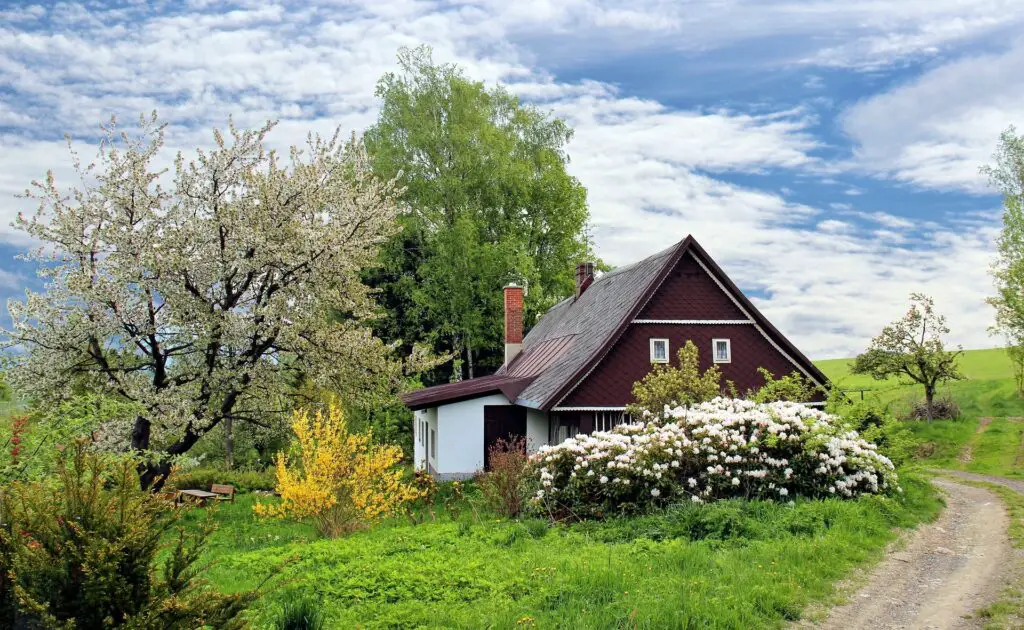
Table of Contents
IELTS CUE CARD
Describe a house or an apartment you would like to live in
You should say: What it is like? Where it would be? Why you would like to live in this house/apartment? And how you feel about this house/apartment?
Sample Answer 1
Introduction:
For most people buying a house is the primary aim of life. When their career is on the right trajectory , they buy a house or an apartment. Although I have a home of my own, I would like to purchase another one as per my needs.
What it is like?, and Where it would be?
I do not wish to live in big accommodation, because spending much on the maintenance and upkeep of the property is not a prudent approach. Moreover, I will buy a house in the countryside with a large terrace and a swimming pool.
For electricity supply, I will opt for renewable energy, I would install panels on the roof to tap solar energy. Apart from this, I would make sufficient arrangements to do rainwater harvesting .
Why you would like to live in this house/apartment?
Being a nature-loving person, I would buy an abode that must be away from the hustle and bustle of cities because traffic congestion catches my head.
Furthermore, I am a fitness enthusiast, and a house in the countryside would allow to me breathe clean and pristine air. Another benefit I would get is organic food available in the hinterlands. That would help me to get proper nutrition.
Lastly, I always love to do things beyond the conventional domain. And building a house in the countryside with modern facilities is something special
AND how do you feel about this house/apartment?
Living in my dream home would help me live a peaceful and comfortable life.
Sample Answer 2
Being a flamboyant person, I like my dream home to be a special one.
What it is like?
My dream home is a luxurious house loaded with features.
Where it would be?
It would be in the heart of the city, because being an extrovert, I love to live in an area with hustle and bustle nearby.
I would like to live in this house apartment for various reasons. First and foremost, I love to live an opulent lifestyle . And staying in a big house would empower me to take full use of luxuries at my disposal.
Moreover, being a social butterfly, I love to throw parties. A spacious house would help organise events at my home with tremendous ease: Moreover, the lawn would be an added advantage to make the guests feel comfortable.
Another reason for owning a big house is to have a spacious kitchen. As I am a connoisseur of food, cooking is my passion. During my free time, I would cook numerous mouth-watering delicacies to pamper the appetite of my family members.
Lastly, having sufficient space would empower me to build a library inside the house. Being a voracious reader, I love to read different books, and by loading my library with numerous books, I will encourage my family members to read a lot.
And how do you feel about this house/apartment?
Shifting to my dream house will be a dream come true moment. I am trying my best by working with determination, dedication and discipline to achieve my aim.
Sample Answer 3
Introduction
Buying the dream home is the most significant wish a person has. I have the perfect picture of my future abode in my mind.
I would live in a 3bhk house with all the modern amenities. Being a nature-loving person, I want my home to have facilities like rainwater harvesting. Moreover, I love to eat organic vegetables and fruits, and for this reason, I will maintain a garden in the rear part of my house where I will grow seasonal vegetables.
Furthermore, I will have a big classroom in my house, where I will impart training to children from humble backgrounds. I aim to bring a paradigm shift in their attitude and lead their lives towards an impressive growth trajectory.
Lastly, I will make sufficient arrangements for organising parties in my house. The drawing room would act as a party hall. Being a social butterfly, I love interacting with people from diverse backgrounds. By having events inside my home, I would enhance my friend circle.
Hitherto I have been staying in North India which consists of plains and hills. However, I would like to have my dream abode near the seashore.
I have this uncanny knack for doing things beyond the conventional domain. I have enjoyed my life in plains and hills, but the thrill of the sea is missing.
I will live in this apartment to experience life near the beach, and I will regularly participate in snorkelling, scuba diving and many other sea pursuits.
I staunchly believe that living in my dream house would all colours to my life.
Follow up Questions
Here are some examples of follow-up questions that the examiner might ask during your speaking part 3 related to the cue card “ Describe a house or an apartment you would like to live in ”.
1. Do most Indian people live in an apartment or house?
A large section of Indian society lives in rural areas. And people from the countryside love to live in houses. As far as cities are concerned, the percentage of people living in apartments is rising tremendously. The prominent reason behind this change is the scarcity of space in the cities.
As the population in cities is growing by leaps and bounds, governments do not have any other option but to construct apartments.
2. Do young people in your country like to live with their parents or by themselves?
In my country, joint families in a trend for ages. However, in the last few decades, the percentage of nuclear families has increased considerably. And the reason for such a paradigm shift is that youngsters have started giving preference to independent life.
3. Would you live in a foreign country in the future?
Being a travel enthusiast, I tend to live in different places. Although I have stayed in many cities in my country, I haven’t stayed abroad for a long time yet. Due to this reason, I have a dream to spend four to five years of my life in a foreign country.
4. How is modern home design in your country different to that of the past?
In the past houses were simple, however, nowadays they have numerous features. Firstly, there are innumerable options available for interiors. The use of pop has grown manifold.
Moreover, these days houses are made on pillars. Due to this, most houses are earthquake-proof.
5. In your country what type of home do most people live in?
As joint families are prevalent in India. Most people live in single-storey or double-storey houses,
6. What kinds of apartments are the most popular?
Apartments with lifts are the most popular in India. Because for old age people, it is challenging to climb stairs.
7. What are the differences between houses that young people and old people like?
Young people pay more heed to the style of the houses. On the other hand, older people pay attention to the comfort and strength of the abode.
8. What are the differences between apartments and houses?
Apartments owners do not have roof rights. All apartment owners are partial owners of roofs. Moreover, the size of a house is generally bigger than that of an apartment. Another notable feature is extra facilities like a swimming pool and club which are easily available with apartments.
9. Do people usually rent or buy a house? Why?
People usually rent a house because buying it requires a lot of capital expenditure. On the other hand, renting a home does not require much expenditure. Moreover, after buying a home, shifting to another place looks cumbersome. However, for those who stay on rent them shifting to other accommodation is an easy process.
Latest Cue Cards Jan to Apr 2023
1. Describe something that you did with someone/a group of people IELTS Cue Card
2. Describe a daily routine that you enjoy IELTS Cue Card
3. Describe a place you visited where the air was polluted IELTS Cue Card
4. Describe an actor or actress whom you admire IELTS Cue Card
5. Describe a person you would like to study or work with IELTS Cue Card
6. Describe a time when you were late IELTS Cue Card
7. Describe an advertisement that you don’t like IELTS Cue Card
8. Describe a person who inspired you to do something interesting IELTS Cue Card
9. Describe a website which helped you to do something/ website you visit often/use regularly IELTS Cue Card
10. Describe a piece of good news you heard from others IELTS Cue Card
2 thoughts on “Describe a house or an apartment you would like to live in IELTS Cue Card”
- Pingback: Describe A Gift You Would Like To Buy For Your Friend IELTS Cue Card
- Pingback: Describe A Person You Follow On Social Media IELTS Cue Card
Leave a Comment Cancel reply
Save my name, email, and website in this browser for the next time I comment.

IELTS Mentor "IELTS Preparation & Sample Answer"
- Skip to content
- Jump to main navigation and login
Nav view search
- IELTS Sample
IELTS Writing Task 2/ Essay Topics with sample answer.
Ielts essay # 1159 - living in an apartment instead of a university dormitory, ielts writing task 2/ ielts essay:, some people believe that living in an apartment instead of a university dormitory has many advantages while others say that it has many disadvantages., discuss the advantages and disadvantages of living in an apartment instead of a university dormitory. what type of accommodation would you prefer why .
- IELTS Essay
- Writing Task 2
- Advantages and Disadvantages Essay
- IELTS Essay Sample
IELTS Materials
- IELTS Bar Graph
- IELTS Line Graph
- IELTS Table Chart
- IELTS Flow Chart
- IELTS Pie Chart
- IELTS Letter Writing
- Academic Reading
Useful Links
- IELTS Secrets
- Band Score Calculator
- Exam Specific Tips
- Useful Websites
- IELTS Preparation Tips
- Academic Reading Tips
- Academic Writing Tips
- GT Writing Tips
- Listening Tips
- Speaking Tips
- IELTS Grammar Review
- IELTS Vocabulary
- IELTS Cue Cards
- IELTS Life Skills
- Letter Types

- Privacy Policy
- Cookie Policy
- Copyright Notice
- HTML Sitemap
living in a house compared with in an apartment; 'scarce land resources'
iishine 4 / 6 Sep 6, 2010 #1 please revise my ielts essay and give me your advise, I really need it to improve my writing skill. thank you very much! Some people prefer to live in a house, while others feel that there are more advantages to living in a apartment. Are there more advantages than disadvantages of living in a house compared with in an apartment? In major cities, people can choose the types of accommodation depends on their own conditions and favorites. Some people prefer to living in a house, while others like apartments more than houses. There are numerous advantages of living in an apartment, so many people think it is a good choice for accommodation. Firstly, apartments make some individuals live a simple life. For instance, people who live in an apartment do not take care to clean the staircase and yard, and there is no need to trim the lawn as well. Secondly, as we all know, apartments are more secure than houses. There are alarms and 24-hours video surveillance in apartments, and people who go on vacation just have one key and lock to take care. Finally, living in an apartment can afford people a sense of community. For me, I am living in a multistory apartment and always communicate with my neighbors about work, cooking and current affairs. Usually, I take part in recreational activities organized by our community and share other inhabitants with the joy of interaction. Granted, living in a house also has several merits. For example, the house can offer people much more spacious room and give them a sense of possession. For children, they have better opportunities to go outside to enjoy the natural sunshine and fresh air. Most importantly, people who live in houses can enjoy the peaceful circumstance and would not be disturbed by conflicts between them and their neighbors. In conclusion, I must say both options can be good or bad, depending on people's own considerations. But for myself, I assert that the apartment is a better choice for me, especially nowadays the land resources are scarce and the increasing number of world people.
Nnadozie 3 / 6 Sep 6, 2010 #2 IN MAJOR COUNTRIES, PEOPLE CAN CHOOSE THE TYPES OF ACCOMMODATION 'DEPENDING' ON THEIR CONDITIONS AND FAVORITES.... especially nowadays 'that' land resources are scarce and the increasing number of world people.

- Share full article
Advertisement
Supported by
The Benefits of Living in the Same Place for a Long Time
Thirty years ago, a woman got a $250-a-month, rent-stabilized apartment in Inwood. She says the neighborhood has defined not only her life but her life’s work.

By D.W. Gibson
The last time Arlene Schulman went looking for an apartment, the internet was only in its infancy. “I did what everyone did 30 years ago,” Ms. Schulman said. “I asked everyone I knew if they knew about an available apartment.”
Like most other apartment hunters in the 1990s, she also rushed to grab a copy of The Village Voice on Thursday nights to thumb through the classified ads. “I remember being very aggressive because I knew my income wasn’t increasing as fast as the rent,” she said.
A co-worker tipped her off to a one-bedroom in Inwood. “She said, ‘Can you afford $250 a month?’”
At the time, Ms. Schulman was working for ABC News, thinking about going out on her own as a freelance photographer and writer. She was paying $1,000 a month for a studio on the Upper East Side. She understood that the opportunity to slash her rent so dramatically would completely reconfigure her life. “That $250 represented a great deal of freedom,” she said. “For someone from the artistic economic class of people, your income fluctuates. You can be doing really well one month and not so well the next. That $250 was something that I could afford no matter what.”
And the freedom could be enduring because the available apartment in the six-story building was rent-stabilized, which meant her rent increases would be measured and predictable. So, she took the A train to the final stop at the northern tip of Manhattan and never looked back.
She did upgrade to a one-bedroom on the top floor about five years after moving in. “I’m in the penthouse,” she said, laughing. “There’s no one above me.”
It’s also the quieter side of the building. “The front is exposed to sirens and traffic,” she said, “but if you go around to my side, it’s so quiet you can hear the raccoons fighting.”
The apartment is filled with artifacts from three decades of freedom, an old typewriter, stacks of books, photographs lining the walls. She started photographing boxing on a whim and ended up documenting the sport for 10 years, taking pictures of everyone from Joe Frazier to Ray Arcel . “There was something about the warmth of the community but also the intensity,” she said. “It was something that I really embraced.”
She spent time photographing the Yankees and the Mets, police officers and everyday New Yorkers. “This apartment has my creative history,” she said. “It’s my refuge. I don’t go to a coffee shop. Why would I? My stuff is here. My refrigerator is here.”
She keeps the place from feeling stale by routinely rearranging the furniture. “My couch has been in every corner of the living room,” she said. Most of her furnishings were bought secondhand, or taken off the street. An old sign for a neighborhood pizza parlor hangs on the wall above her couch. “It makes me happy knowing it didn’t go into a landfill,” she said. “I try to conserve.”
$1,116 | Inwood
Arlene Schulman, 62
Occupation: Writer, filmmaker and photographer
On the old guard: When Ms. Schulman first moved into her building, she recalls that it was mostly filled with older women. “They had raised their families, their husbands had passed away, and they were living by themselves,” she said. “They were great security because they would sit outside the building in beach chairs, watching everything.”
On colors: While Ms. Schulman prefers to wear solid, dark colors — almost exclusively — she gives her apartment an entirely different treatment. “Color doesn’t look good on me, that’s for the living room. I dress monochromatically, but the apartment is another story. I love color and I love printmaking.”
Inwood has not only helped define Ms. Schulman’s décor but also the direction of her work. In recent years, she’s focused on short film projects; most are about her neighborhood in one way or another. She made an ode to the life of a beloved baker named Renee Mancino in one project, and in another she interviewed Lin-Manuel Miranda about disappearing into the wilds of Inwood Hill Park as a child.
“There’s something magical in this neighborhood,” she said. “When I’m looking for another subject or story, something always comes up. ‘Neighbor’ here doesn’t just mean next door. To many people up here, ‘neighbor’ means anyone in Inwood.”
For a film project about a man in the early stages of dementia yet still caring for his mother with Alzheimer’s, Ms. Schulman was able to raise funding from local small businesses. The supermarket where she shops pledged money, so did the car service she uses.
More recently she raised $2,500 in initial funds for an upcoming project about a small community of Greek Jews from Ioannina, where her maternal grandparents once lived.
In some ways, she feels like she’s experienced the entirety of New York City, all from one building in one neighborhood. “We’re a microcosm of whatever happens in the city,” she said. “Packages stolen, fires, domestic violence, noise complaints — whatever happens in the city, it’s happened here over the decades.”
There was the hoarder who left a window open so pigeons could nest in the apartment. “The odor on certain days, it was really bad,” she recalled. “I was afraid to have people in the building.”
Over the years, there have been not one but three fires. “By the third fire, you become better at managing your fear and knowing what to do,” she said.
Ms. Schulman’s fire alarm went off two years ago. She was riding the subway and her phone was flooded with notifications from people trying to make sure she was OK. Luckily, it was a false alarm. “People look out for each other,” she said. “It isn’t some anonymous place. You may not know everyone by name, but everyone is very friendly. We even have clusters of families in the building, where you’ll find different branches of the same family in different apartments.”
She has watched several neighbors age, and a couple of them die. “As the years went by,” she said, “I’d see a cane, then a walker, then a wheelchair, then a home attendant, then they weren’t there anymore — they were gone. It was like watching the ecosystem of the building.”
Each change in that ecosystem alters Ms. Schulman’s experience in her own home. There was the neighbor who shouted at his TV every year during the Super Bowl. “When the Super Bowl came along after he died,” she recalled, “it was that feeling of, ‘Oh wait, something’s missing.’”
But there have been plenty of births, too, and demographic shifts marked by changes in the mouthwatering smells at dinnertime. Gone are the days of Irish neighbors with corned beef and cabbage wafting in the hallway. “I open the door now and someone is making Dominican cuisine,” she said. “It smells so good, oh my God. I’m tempted to knock on the door: ‘Any leftovers?’”
The changes are vivifying, each is a new way to relate to the world around her. She can’t imagine living anywhere else. “I’ve experienced a few cycles of life myself,” she said. “And I live in a neighborhood that has really fostered my creativity so I don’t see a need to leave. Who knows? This could be my final apartment.”
For weekly email updates on residential real estate news, sign up here . Follow us on Twitter: @nytrealestate .
An earlier version of this article misspelled the surname of a baker who was the subject of a short film by Arlene Schulman. She is Renee Mancino, not Mancion.
How we handle corrections
The State of Real Estate
Whether you’re renting, buying or selling, here’s a look at real estate trends..
Hiring a local to keep an eye on your weekend house can give you peace of mind and keep small problems from becoming big headaches.
Are you a second-home person? A place outside the city might sound like heaven , but here are some things you should consider first.
The pandemic upset a delicate balance of part-time and full-time residents in a community in the Poconos, sparking a debate over short-term rentals .
After a lifetime of seeking out tiny spaces, she finally found a keeper : a former barbershop in an old mill village in North Carolina.
A lot of change is happening in the housing market. Here’s the outlook .
With a landmark legal settlement poised to upend a decades-old norm that has dictated who pays real estate agents and how much, economists, agents and lenders are beginning to worry that the burden could now be on first-time home buyers .
I live with my 4 kids, husband, and aunt in a 2-bedroom apartment in LA. We can't find a bigger place, so we make it work.
- My family consists of seven people, and we all live in a two-bedroom apartment in Los Angeles.
- We've been trying to find a bigger place, but we can't afford one in the city.
- After redecorating the apartment and buying new furniture, we make it work for all of us.

When we first moved to Los Angeles, our two-bedroom apartment had more than enough room for our family of five .
Once my husband, my three daughters, and I arrived in March of 2012, we were more than happy with our two-bedroom , one-and-a-half-bath apartment, which came with a dishwasher. In all, the place was 950 square feet. It was especially great because we lived near good schools, and it was in a very safe area. Plus, the apartment was in a gated building with a parking lot.
For years, this apartment worked for us. But then another baby came, and our family continued to grow .
We added two people to our family
While living in LA, my aunt visited from Chicago frequently because she loved spending time with my kids ; they were little and adored her, too. As time went on and my aunt got older, she retired. We invited her to live with us, even though she refused.
Then, in 2017, I had my 4th child, a son. When the pandemic hit, we had three teenagers and a toddler living in the apartment. In early 2020, my aunt had been visiting us for a while and hadn't set a date to return to Chicago yet; then she got stuck here. For a while, we weren't sure when and if she was going back to Chicago. We discussed giving up her apartment and moving to California for good as she was getting up there in age. I was worried about her living on her own as health problems began to arise.
My husband then had time off from work due to the pandemic. That meant the seven of us were stuck in our 950-square-foot apartment — full-time.
I was homeschooling the three oldest kids with a 3 year old running around. It wasn't easy.
Related stories
I constantly felt overwhelmed and had a great lack of privacy. My husband, son, and I shared a king-sized bed in our small bedroom, while my three teens shared the second bedroom. My aunt got the living room.
My only solace was my desk with my computer, where I would play video games or write to take my mind off the fear of what was happening in the outside world. To say I was stressed out was an understatement.
We wanted to move out, but we decided to redecorate instead
By 2021, we decided to move, which was easier said than done. We currently pay $2,100 a month for our apartment, but we realized that if we wanted a bigger place in LA, we needed to pay $3,000.
Finding a new place during the pandemic was another bag of problems. Many places were holding crowded open houses , which we tried to avoid. It seemed like everyone was trying to move at the same time. It was impossible; we couldn't find the right place for us. Many places seemed to frown when we told them we were a family of seven.
After lots of looking, we finally gave in and decided to stay put for the time being. With more free time around the house when the pandemic let up, I started decorating and remodeling . We ordered new furniture and housewares. The older kids were disappointed we wouldn't be moving but were willing to help reorganize and redecorate.
We started with the three teenagers. Having three kids in a bedroom is never ideal, but thankfully, they all get along well. We bought a new bunkbed, and the oldest child got a loft bed with a desk at the bottom.
My son continued to share a bedroom with us, but on his 7th birthday, we got him his own bed, which he was excited about. My husband and I bought ourselves a new bed frame. I then transformed the bedroom into the cottage core room of my dreams. I hung fake flowers, vintage postcards, and frames with K-pop groups .
Lastly, my aunt got a comfy reclining chair and a bed in the living room. After a certain time of night, the living room becomes her bedroom. Eventually, we also bought two new sofas for family movie nights that we could all fit on.
We're still looking to move
We still occasionally have issues with only two bathrooms, but we remind our kids that my husband and I grew up with one bathroom and several siblings.
We're still planning on moving. We look at rentals from time to time when something good comes up on Zillow. We have even seriously discussed moving out of Los Angeles as our rent continues to go up. But for now, we're staying put and making it work.
Watch: How a 'hoarder's house' is deep cleaned
- Main content
LAist is part of Southern California Public Radio, a member-supported public media network.

It's Spring! Here's A Few Tips For Cleaning And Decluttering Your Living Space

A season for cleaning
Six tips for spring cleaning your house or apartment, after decluttering, where to donate.
For Atwater Village resident Laura Cowan, deep cleaning her home this spring means more than just decluttering and dusting off hard-to-reach spaces. It’s a fresh mind shift.
“I get sad in the wintertime,” Cowan said. “I think instead of the new year, [springtime] is more about renewing your commitment to yourself, your life and what you want to be.”
It’ll also be a time of deep reflection for her. She lost both of her parents and her father-in-law within the first few years of getting married and buying a house with her husband. Her house has become a storage area, full of random items they’ve inherited or kept from their past lives.
Now, this spring, she’s on a mission to clean her house up.
“I do a deep cleaning of my own feelings and emotions this time of year too,” Cowan said. “Sometimes in life, you're pushing things down the road. I just want to clear everything out, physically, mentally, emotionally.”
Cowan is one of several Americans who will embark on decluttering, dusting and disinfecting their living spaces this spring. According to the American Cleaning Institute study, 87% of Americans feel like they’re at their mental and physical best when they have a clean home.
Plus, it's allergy season . Dust in one’s home could contain allergens like dust mites, pet dander and mold. And with all the rain we’ve had, blooms are in full force with Santa Ana winds and spring breezes likely blowing pollen through your window.
But where to start? We all know it's a good thing to give our living spaces a big, deep clean once or twice a year. But it can be overwhelming. Where to begin? How to fit it in a busy schedule? What supplies to get?
We’ve got you covered with tips from some pros and a few resourceful Angelenos who responded to our social media post on X, formerly known as Twitter.
Start small
Arjun and Nancy Mehta are the owners of a Molly Maid cleaning franchise in L.A. and they say they see an uptick in clients during this time of year because. As the days get warmer, people open their doors more, invite people over, and want to have a clean home.
But, they warn, don’t do too much at once.
They recommend starting with a smaller room like a home office or a den, rather than the kitchen or the bathroom so that you can feel accomplished at the end of the day.
“Do it section by section,” Nancy Mehta said. “Don’t try to tackle it all in one Saturday where you’re going to get your day completely destroyed by cleaning.”
Use a microfiber towel
Whether it's dirt, pollen or pet hair, dust and particles accumulate everywhere.
“There is something about the combination of a microfiber towel and a little bit of water. Water on a microfiber towel that traps the dust,” Nancy Mehta said.
If it’s been a long time, she recommends using a combination dish soap, vinegar and water to get rid of more stubborn dust.
“You want to try to eliminate the dust so that it doesn't go up in the air and come back down,” she added. “The microfiber towel is more of a trapper than anything else.”
Don't over-rely on chemicals
Laura Cowan said her husband has respiratory issues which has caused them to stop using almost all chemical cleaners. Some products release volatile organic compounds (VOCs), which can cause chronic respiratory problems, along with other health issues.
“Baking soda, vinegar, hot water, biodegradable, just everyday soap all do about 99% of what you want and need,” Cowan said. “Tea tree oil with a little alcohol in a spray bottle makes it a nice alternative.”
Clear out the clothes
South L.A. resident Teja Smith said spring cleaning gives her a peace of mind, especially as a busy millennial with a social media agency. Her first target is her closet.
“Spring cleaning to me is getting things out of your main areas and putting things in storage, which is a great way to bring back wardrobes and get yourself excited about certain items back in your house,” Smith said.
She takes time to declutter and refresh twice a year in the spring and fall. Her tip? Ask yourself: Have you worn that lately?
“It’s really just a non-tedious process of realizing what I've worn in the last six months and realizing what I either need to wear or move,” Smith said. “If it still doesn't get used … then it goes.”
Give yourself some grace
Cowan said she struggles with setting high expectations for herself, but the process of spring cleaning can be reassuring when you are overwhelmed with life. There is also a lot of emotion that goes along with “letting go” of things that may have sentimental value or bring up memories.
She said it’s important to ask yourself questions like: Is this particular item serving me? And is this helping me get to where I want to go?
If it feels like a lot, she says to give yourself grace.
“If you're doing this for the first time in a long time, it can be intimidating and scary,” Cowan said. “Something is better than nothing. Only you know what it was supposed to look like. Just do it because it makes you feel good.”
Go slow and take the time you need to process the “letting go” of things.
Here’s one last thing that might seem overwhelming, but doesn’t need to be. At the end of all your clearing out, you might have a pile of things — clothes, sports equipment, homewares — that you might think is too good to throw out. Or maybe you just want to avoid adding too much more to our brimming landfills.
Regardless of motivation, here’s some options to consider for passing on all that excess stuff without tossing in the trash: donate, consign, recycle.
There is always the Goodwill or the Salvation Army, which will take gently used items for donation almost any day of the week. But there’s plenty of other spots to consider as well. Just be sure to call ahead before dropping stuff off .
- Alexandria House in Koreatown offers supportive housing for women and children who are experiencing homelessness and trauma
- Los Angeles Mission serves people living on Skid Row
- Downtown Women’s Shelter exclusively serves women and gender diverse people experiencing homelessness
- El Nido Family Centers serves low-income families in need across L.A. County
- Miriam’s House is a sober living home for women and their families.
- Habitat for Humanity accepts gently used appliances and furniture
- San Fernando Rescue Mission Alliance provides shelter to families experiencing homeless and recovery services to men experiencing homelessness and living with substance abuse issues, as well as job counseling support
- Out of the Closet Thrift Store helps raise funds and awareness for HIV and AIDS, and provides free HIV testing
- Animal shelters and animal rescue organizations typically accept hand-me-down towels as well as gear like leashes and harnesses
If you have an unworn or barely used dress in that closet of yours and would like to make a little money back on that purchase, consider a consignment shop, which will offer to sell it for you for a piece of the profit.
- Trove in West L.A. accepts clothes, accessories and housewares that are in good shape based on a seasonal basis and other demands
- Gift of Garb in Silver Lake is a little more high end but if you’ve got that Gucci belt collecting dust in your armoire, see if you can resell it
- Left Bank is not a traditional consignment shop but, similar to Crossroads , this shop will buy or trade clothes in exchange for money or store credit
- Rebag specializes in designer purses and will buy, trade or consign that Louis Vuitton you just don’t use anymore (as long as its in good shape)
If you’re conscious about the environment and want to find a way to get rid of things that may not be in decent enough shape to donate or consign, you could check out Ridwell . You need to get a membership but, for a fee, it will pick up your old threads — as well as other items — each month. You put your recyclables in a bag, and the workers get the bag right at your front door.
Locally, there's also the Suay It Forward program at Suay in L.A. where you can buy a $20 recycling bag in exchange for $20 in store credit. Fill up the bag with unwanted clothes and fabrics and drop it in their bin.


Phoenix homes under construction near 59th Avenue and Baseline Road destroyed in overnight fire

PHOENIX — Fire investigators are working to determine what caused a massive fire that destroyed more than a dozen homes under construction.
Firefighters were called to the scene near 59th Avenue and Baseline Road around 11:30 p.m. Sunday where multiple homes were engulfed in flames.
Phoenix Fire Department officials say more than 75 firefighters from seven Valley cities were called and eventually put out the blaze.

Flames destroyed up to 17 homes and severely damaged three others. The homes are part of a D.R. Horton build-to-rent community scheduled to be finished by year’s end. The homes were not available for lease yet.
Fortunately, no injuries were reported.
The cause of the fire is under investigation.
“We’ve not ruled out anything. Everything is on the table,” said Captain Rob McDade, a spokesman for the Phoenix Fire Department.
He said the Phoenix Fire Investigations Task Force – made of fire investigators, police detectives, and an arson dog are on scene. They will collect evidence, including interviewing any witnesses and trying to find the fire’s origin.
“This is a long, protracted investigation,” he said.
See video of the aftermath in the player below:
Phoenix Fire Captain Todd Keller said there were multiple security cameras on the property, which will help with the investigation.
Because the area is a new housing development, Keller said the water grid isn’t fully set up. Some of the fire hydrants weren’t connected to water.
The dirt roads were also a problem for fire crews as they poured water on the flames.
“It was getting real muddy,” Keller said.
The developer, D.R. Horton, sent a statement to ABC15:
“The homes under construction near 59th Avenue and Baseline Road are part of a D.R. Horton build-to-rent community that was scheduled to be completed by the end of the year. Fortunately, we are not aware of any injuries as a result of the fire last night. We are grateful to and thank all of the firefighters and first responders that acted quickly to extinguish the fire.”
This is the second major blaze impacting homes under construction that ABC15 has reported on within a week.
A fire ripped through an apartment complex site in Prescott Valley last week , causing an estimated $60 million in damage.
That incident is believed to be linked to a string of property damage incidents and other fires in the Prescott Valley area.
There have also been several Valley fires that have resulted in injuries since the end of last month — a baby and a woman were hurt in a fire in Glendale , and a man and child were hurt in a Phoenix apartment fire.
Email ABC15 Investigator Anne Ryman at [email protected] , call her at 602-685-6345, or connect on X, formerly known as Twitter , and Facebook .
Report a typo
Sign up for the Headlines Newsletter and receive up to date information.
Now signed up to receive the headlines newsletter..

Record and watch live TV, subscription-free with Tablo

The Free Financial Advisor
The 10 Best Animals for Apartment and Tiny House Living
Posted: February 22, 2024 | Last updated: February 22, 2024

In the era of urbanization and compact living, finding the perfect pet for smaller residences like apartments and tiny houses is essential.
Here’s a curated list of the top 10 pets that are ideal for limited living spaces, focusing on their adaptability, size, and the unique companionship they offer.
These pets are selected for their suitability in confined environments, ensuring they remain happy and healthy while providing joy and companionship to their owners.

1. Cats: Independent and Adaptable Companions
Cats are a top choice for apartment dwellers due to their self-sufficient nature and comfort in indoor environments. They require minimal space and are content with a cozy corner to sleep and a window to look out of.
Regular playtime and a clean litter box are all they need, making them perfect for individuals with busy lifestyles or limited mobility.

2. Small Dog Breeds: Loyal and Loving
Small dog breeds, such as Shih Tzus, Boston Terriers, and Dachshunds, are well-suited for apartment living. These breeds generally require less space and exercise compared to their larger counterparts. They are known for their affectionate nature and ability to form strong bonds with their owners, making them excellent companions.

3. Rabbits: Gentle and Quiet Pets
Rabbits are an excellent choice for small living spaces. They are quiet, can be litter-trained, and don’t require outdoor space. Providing them with a cage and some time to hop around the apartment daily will keep them happy. Rabbits also have a gentle nature, making them suitable for a peaceful home environment.

4. Hamsters and Gerbils: Perfect Pocket Pets
These small rodents are ideal for people living in tiny houses or apartments. They are housed in cages that can fit in small spaces and are relatively low maintenance. Watching them play and scurry around can be delightful, and their nocturnal nature makes them active during evenings, aligning well with most people’s home schedules.
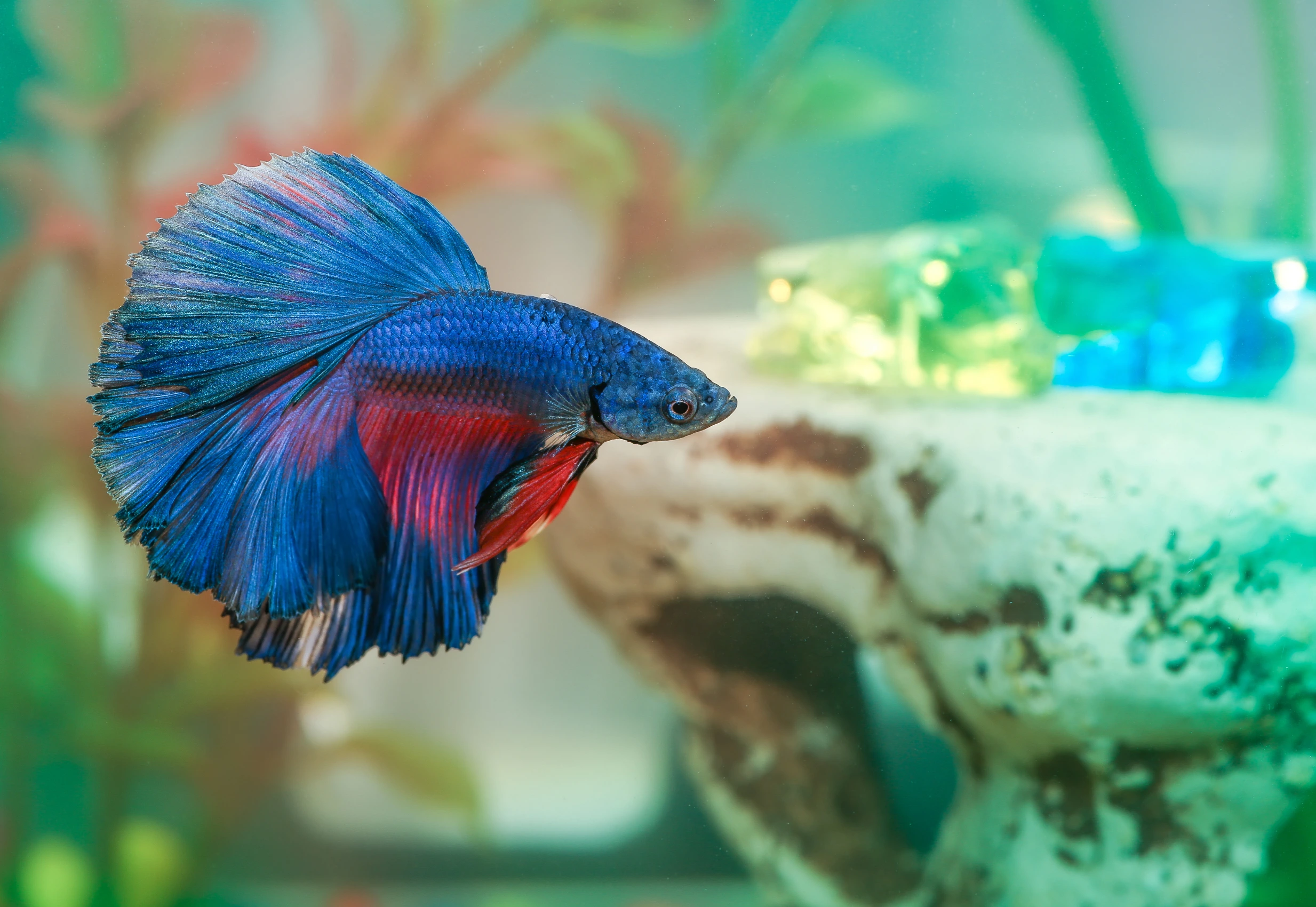
5. Fish: Aquatic Elegance (Betta) Fish
Fish are excellent pets for small spaces. An aquarium not only houses these quiet creatures but also adds a decorative element to your living space. Species like tetras, guppies, and bettas are particularly well-suited for smaller tanks and are relatively easy to care for, making them perfect for beginners.

6. Budgies: Sociable and Entertaining Birds
Budgies are small, colorful birds that thrive in apartment settings. They are social creatures that enjoy interaction and can even learn to mimic speech and sounds. Providing them with a reasonably sized cage and regular engagement will keep them happy and chirpy, adding vibrancy to any small living space.

7. Crested Gecko: Petite and Low-Maintenance
Crested geckos, scientifically known as Correlophus ciliatus, are captivating creatures that make fantastic companions for apartment dwellers seeking a unique and manageable pet.
These petite reptiles, originating from New Caledonia, boast vibrant colors and distinctive crests above their eyes, adding an exotic charm to any living space.
Their small size, typically ranging from 6 to 10 inches in length, makes them perfectly suited for apartment living, as they require minimal space and can thrive in appropriately sized terrariums.

8. Ferrets: Energetic and Playful Companions
Ferrets are lively and curious pets that can adapt well to apartment living with proper care and space management. While they are active and require regular playtime and mental stimulation, they can thrive in smaller living environments with adequate space for exploration and enrichment.
Ferrets are known for their playful antics and can form strong bonds with their owners, providing endless entertainment and companionship.

9. Marmosets: Intelligent and Social Primates
Marmosets are fascinating primates that can be suitable for apartment living under the right circumstances. These small monkeys are highly intelligent and social animals, requiring plenty of mental stimulation and interaction with their human caregivers.
While they may need more space and specialized care compared to some other pets on this list, dedicated owners can provide enriching environments for marmosets in smaller living spaces, fostering a unique bond and companionship experience.

10. Hermit Crabs: Intriguing and Low-Maintenance
Hermit crabs are interesting and easy-to-care-for pets, ideal for small living areas. They require a small tank with a proper habitat setup and are fascinating creatures to observe.
Hermit crabs can be a great choice for those seeking a pet with minimal space and care needs, offering a unique pet-keeping experience.
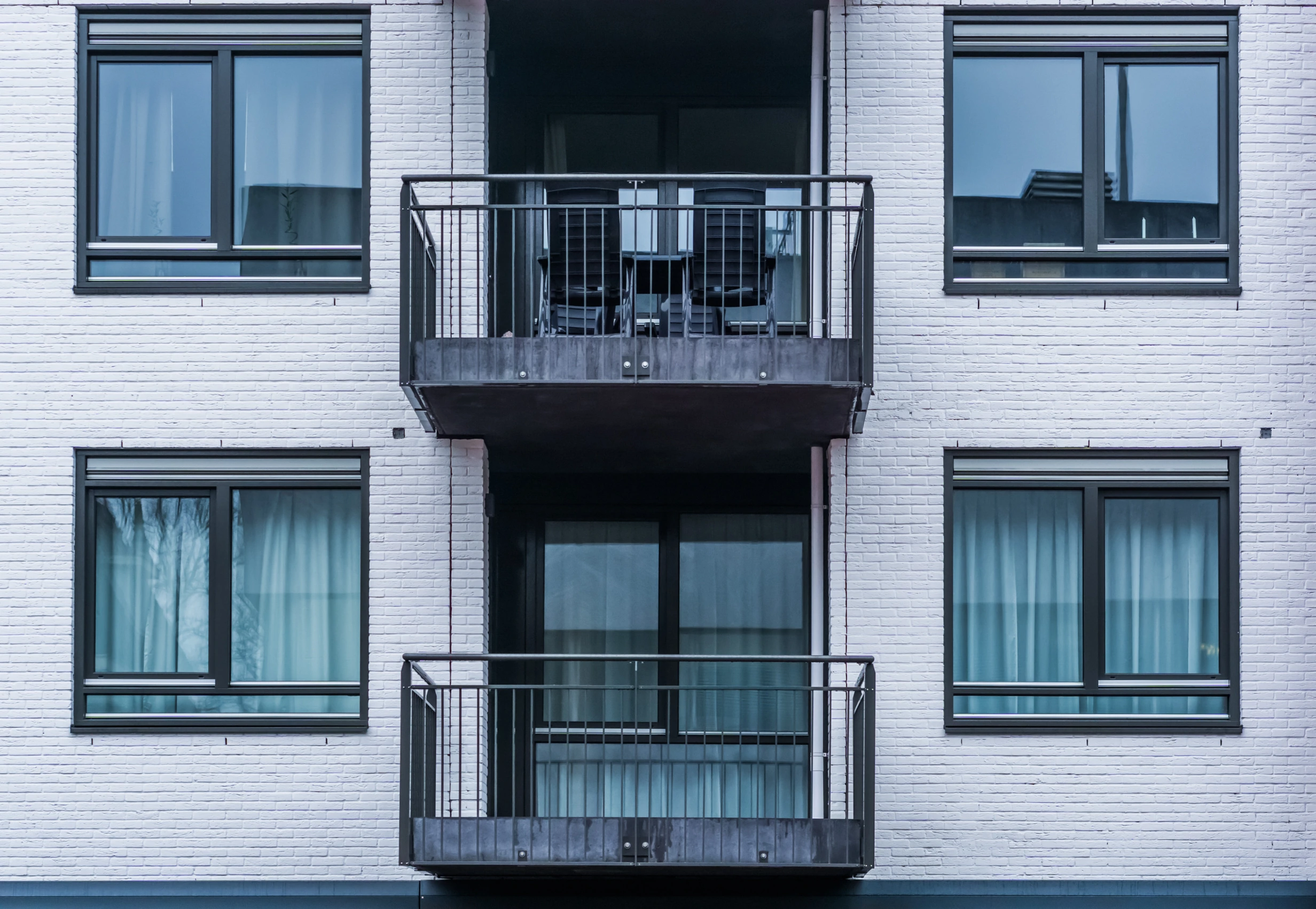
Companionship In Small Spaces
Living in a smaller space doesn’t mean missing out on the joys of pet ownership. These 10 animals are perfectly suited for life in apartments and tiny houses, offering companionship and joy without needing ample space.
When choosing a pet, it’s crucial to consider your lifestyle and the pet’s specific needs to ensure a harmonious living environment for both of you.
Ready to Find Your Perfect Pet? Consider your space, lifestyle, and the type of companionship you seek. Whether you prefer the quiet company of a fish or the playful energy of a small dog, there’s a pet out there that’s perfect for your tiny living space.
More for You
Roman Reigns and Paul Heyman ditch The Rock after WrestleMania loss
Maps show where trillions of cicadas will emerge in the U.S. this spring
Doctor shares what happens to our bodies moments before we die
The Common Household Ingredient That Can Unclog Slow-Draining Sinks And Tubs
Teen ends up with stoma after period pain worry
15 “As Seen On TV” Products That Are Well Worth The Money
I Did a 25 Day Water Fast. I Lost 20lbs and My Skin Cleared Up
Giant lake suddenly returns 130 years after vanishing
Common over-the-counter medicine linked to increased dementia risk
The Best Place To Store Your Canned Tuna Isn't In The Pantry
Say Goodbye To Popcorn Ceilings Without Removing Them Thanks To This DIY
Barnes shares Kevin Garnett wanted to play for the Lakers, but Kobe didn't approve of it: "He wanted to do his thing without Shaq"
How to Tie a Palomar Knot: A Step-by-Step Guide with Photos and Video
Mount Etna, Europe’s largest volcano, puffs giant ‘smoke rings’ into sky
Hand sanitizer, aloe gel recalled over warnings it could cause comas or blindness
I moved from the US to Ireland. Here are 11 things that surprised me most.
Neighbor Deals Major Blow to Russia Amid Sanctions, Invasion Threats
5 people explain what it actually feels like to die
The US Navy’s Constellation class frigate problem is a problem for the world
Easily Remove Super Glue From Any Surface With This Household Staple

COMMENTS
Housework requires less time, as it often takes a whole day to clean up the entire house, especially when one lives alone. Living in an apartment offers the opportunity to select any gym or pool. In conclusion, living in an apartment is better than in a house. It is more affordable and ergonomic. A person spends less time on housework.
Responsibility is a major difference between apartment living and living in a house. Responsibility lies on the self in the case of house living while in an apartment it is divided among various residents. There is always a core committee that is responsible for the decision taken and it is the responsibility of that committee to execute the ...
The Joys of House Living. Transitioning from apartment living to residing in a house marked a transformative experience for my family. The spaciousness of a house proved to be an ideal fit for a large family unit. Unlike the confined quarters of an apartment, a house offers an abundance of open space, catering to the needs of each family member.
Apartments and houses both have their advantages and disadvantages. Apartments have better layers of security, amenities, and are located closer to the city. Renting an apartment would benefit a person with little money. On the other hand, buying a house would benefit a creative person because they are not restricted to a landlord's.
The major problem is the lack of space and privacy. Although one can buy larger apartments according to their need, it will be extravagant. Yet, compared to building a house and maintaining it, an apartment is less costly. Moreover, there are various rules and regulations that the inhabitants have to follow in order to maintain the living ...
A house may be situated in a town neighboring a big city with a rich infrastructure. It can be located in a place with accessible transport. Finally, a city apartment can also be in two hours away from a work place. However, to make a final decision, one better knows in advance about all the pitfalls of moving out of a city, so that a person ...
Band 8.5 essay sample. Everyone wants to live in comfort. Some people find independent houses more convenient while others prefer modern-day apartments. I believe living in an apartment is more advantageous than living in a house for several reasons. To start with, we are moving towards the culture of nuclear families where most adults work.
Views. 2067. Living in a house and living in an apartment have their own set of advantages and disadvantages. An apartment is relatively cheaper and easier to maintain than a real house. An apartment dweller, however, has to deal with responsibilities such as paying the rent on time and complying with the rules of apartment personnel.
House vs. Apartment Living IELTS WRITING TASK 2 You should spend about 40 minutes on this task. Write at least 250 words about the following topic:Certain individuals favor residing in a house, whereas others believe that living in an apartment offers more benefits. Do the advantages of living in a house outweigh the disadvantages when
Space. A one-bedroom apartment usually carries about 600 to 800 feet of floor space, which is much smaller than most homes. Small houses commonly start at about 1,000 square feet. A small 66-foot-long mobile home has a little more than 900 feet of interior space, and even the smallest ones usually have two bedrooms.
The choice of living in a house or in an apartment depends on factors such as availability, rental costs and need and hence a particular style of living cannot be deemed to be the better than the other. ... as some choose to live in a house while others prefer to live in an apartment. The following essay will discuss the advantages and ...
Band 9 IELTS essay sample. While some people live in standalone houses others live in apartments. I prefer living in a house because it provides more freedom and privacy. The merits and demerits of both types of residences will be discussed in this essay. Living in a landed home has many benefits.
Instead of paying $1,300 per month for a high-rise apartment in New York, I pay $900 per month to rent half of a 1935 duplex. My screen door opens onto a patch of yard, shaded by a gnarled old ...
In order to make comparisons as equal as possible, choose apartments and houses in the same general neighborhoods. To make things easier, you might only focus on housing "for rent" rather than for ...
In some colleges, living in dorm is much cheaper than the apartments but in other colleges students prefer to live in apartments which are charged at a lower cost than the dorm. Some of the benefits associated with living in a hall of residence include. We will write a custom essay on your topic tailored to your instructions!
In the other hand, there are 3 differences between living in a house and apartment. Firstly, living in a house would spend more money rather than an apartment. If you think that someday you would buy a house, first thing that you need to purchase is a land. A land is primary requirement to build a house. Thus, it should be really expensive ...
Living in a house is better than living in an apartment. Do you agree and disagree. has more advantages than living in an apartment. Some people favour. whilst others have a contrasting viewpoint. I believe living in. are airy and expandable. more comfortable to live in. Humans need proper oxygen to breathe well.
Living in house vs Living in Apartment Essay. Compare And Contrast: Buying A Home Vs. Renting A Home. are both forms of living in a house that you pay for. The biggest difference is that you own one forever until you sell it, and the other you rent it for however long you need it for (Bostock).
The apartment's living and sleeping areas are separated - the bathroom and bedroom are set back from the kitchen and open plan living, but the use of glass and floor-to-ceiling balcony doors ...
The house should be a duplex building with spacious rooms and corridors. There should be ample space for movement after placing the furniture. Besides, the rooms need to be well ventilated and south facing is preferable. Generally, the south-faced houses have natural light and air supply.
1. Do most Indian people live in an apartment or house? A large section of Indian society lives in rural areas. And people from the countryside love to live in houses. As far as cities are concerned, the percentage of people living in apartments is rising tremendously. The prominent reason behind this change is the scarcity of space in the cities.
Having said that, living in an apartment rather than a university dormitory has some visible disadvantages. First and foremost is the cost. In my country, living in an apartment is quite expensive while the university offers cheap accommodation. The food is also cheaper in the university dining halls. Second, renting an apartment in my city is ...
Some people prefer to living in a house, while others like apartments more than houses. There are numerous advantages of living in an apartment, so many people think it is a good choice for accommodation. Firstly, apartments make some individuals live a simple life.
Thirty years ago, a woman got a $250-a-month, rent-stabilized apartment in Inwood. She says the neighborhood has defined not only her life but her life's work. By D.W. Gibson The last time ...
Essay by Angie Grace. Apr 6, 2024, 6:27 AM PDT. The author, left, redecorated her crowded LA apartment. Courtesy of Angie Grace. My family consists of seven people, and we all live in a two ...
I live in a small house/big apartment. The house is in/on a quiet street. It's near/not far from the train station. There's a garden behind the house. It's a ten-minute walk to/from the town centre. Note that when we say a ten-minute walk, a twenty-minute walk, etc. we use a number + a hyphen ( -) + the word minute in the singular.
Add articles to your saved list and come back to them any time. When we started looking to buy our first home, my partner and I knew it would not be a roomy, four-bedder with two living rooms, an ...
Six tips for spring cleaning your house or apartment Start small Arjun and Nancy Mehtar are the owners of a Molly Maid cleaning franchise in L.A. and they say they see an uptick in clients during ...
Flames destroyed up to 17 homes and severely damaged three others. The homes are part of a D.R. Horton build-to-rent community scheduled to be finished by year's end.
In the era of urbanization and compact living, finding the perfect pet for smaller residences like apartments and tiny houses is essential. Here's a curated list of the top 10 pets that are ...